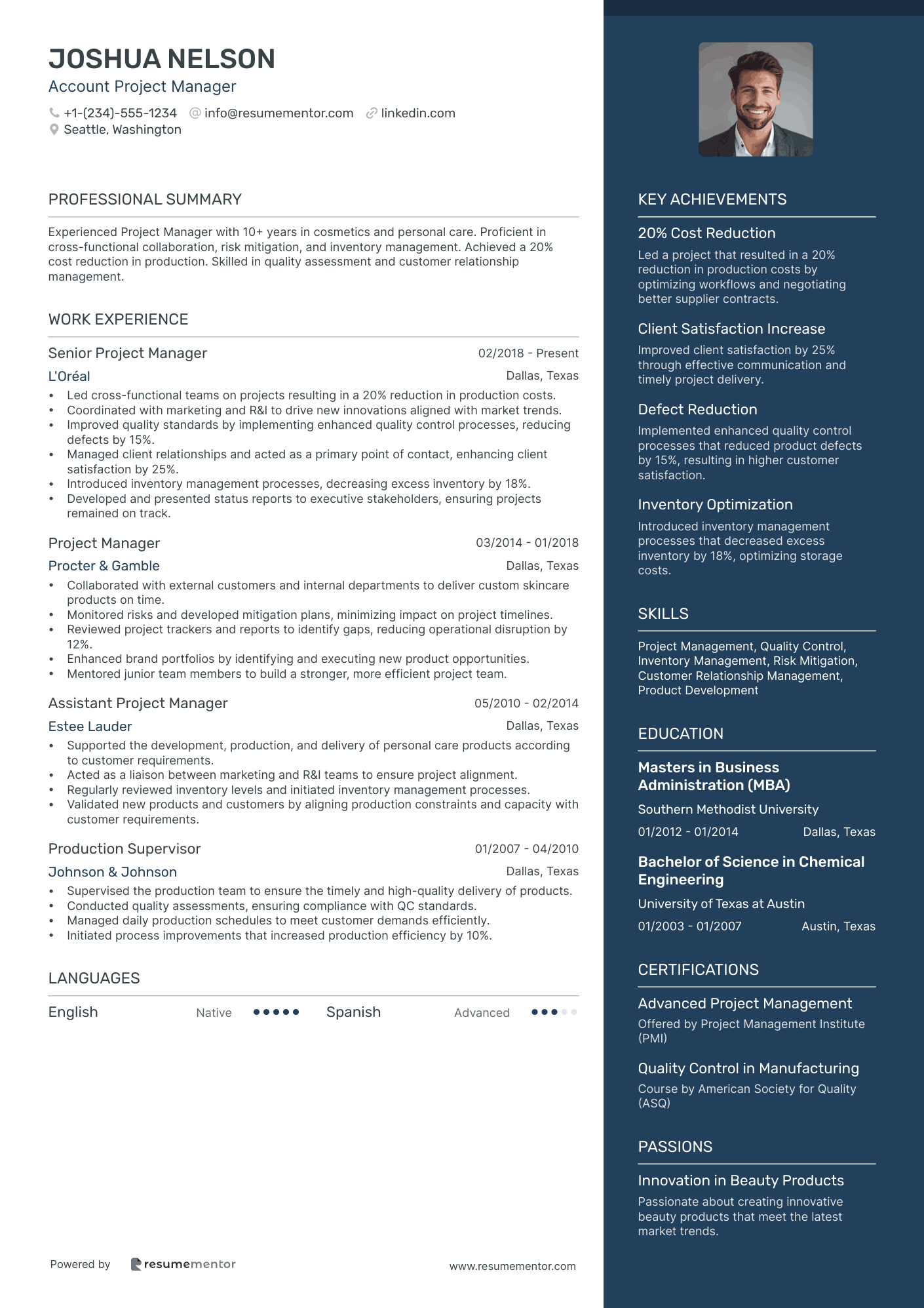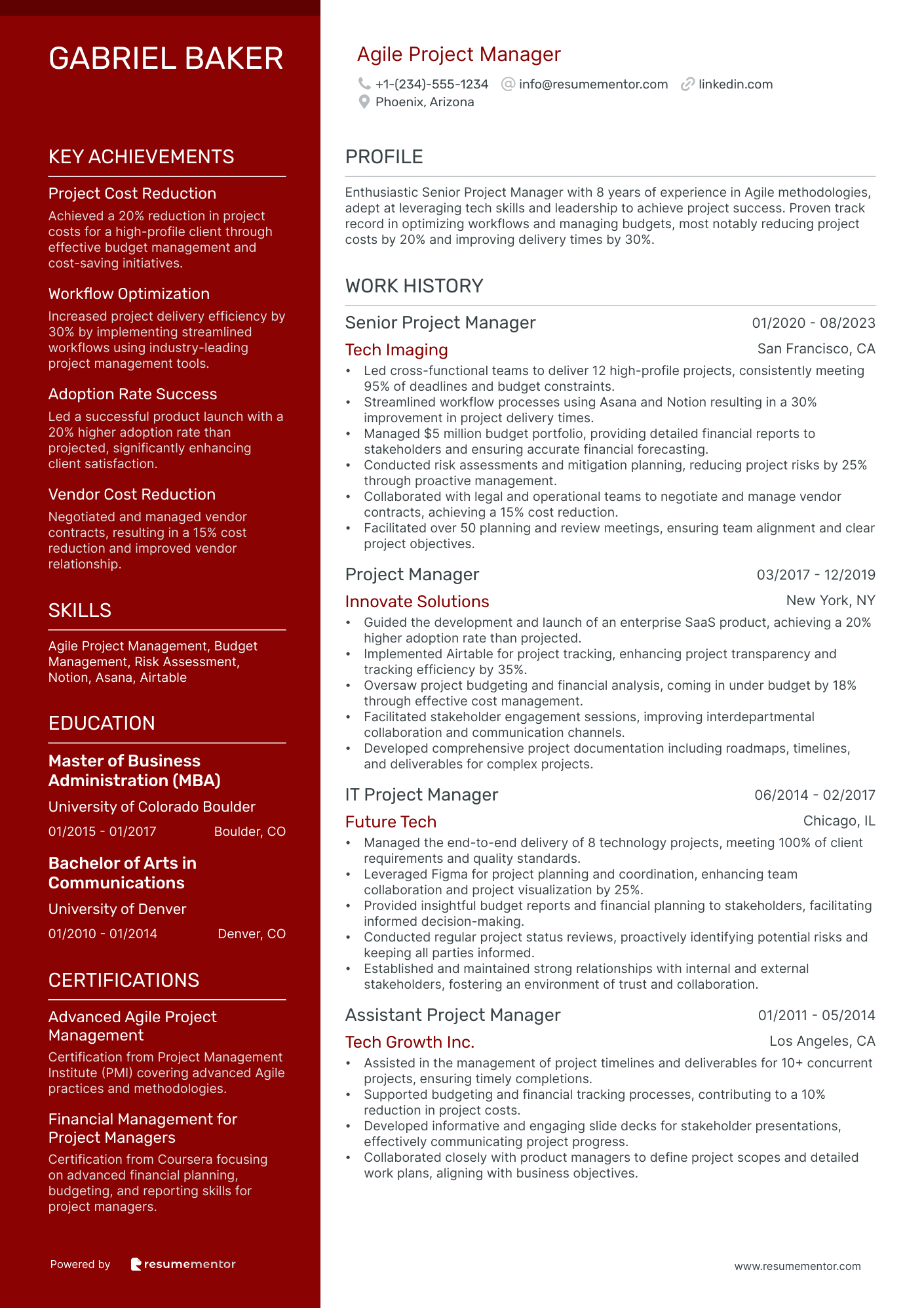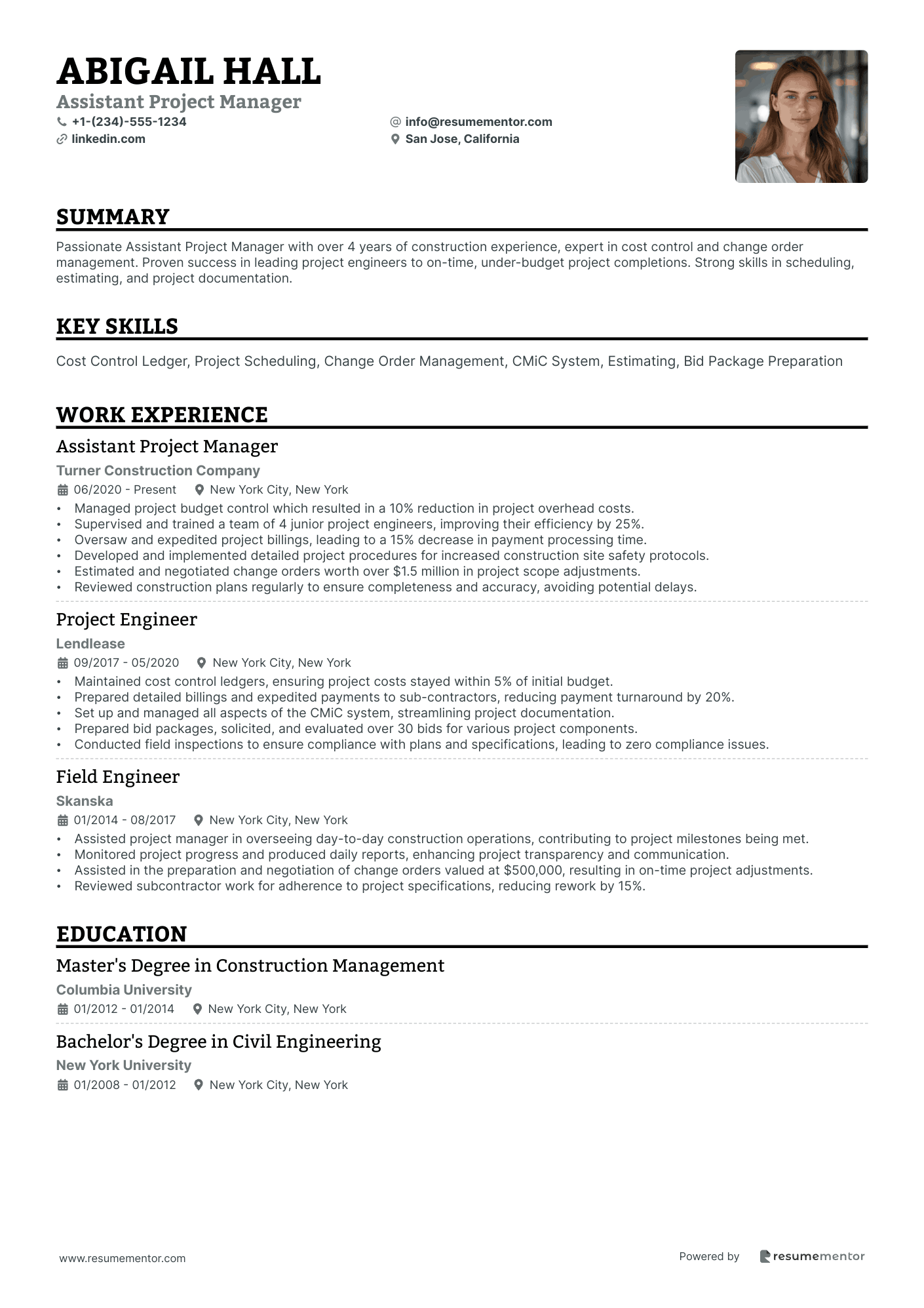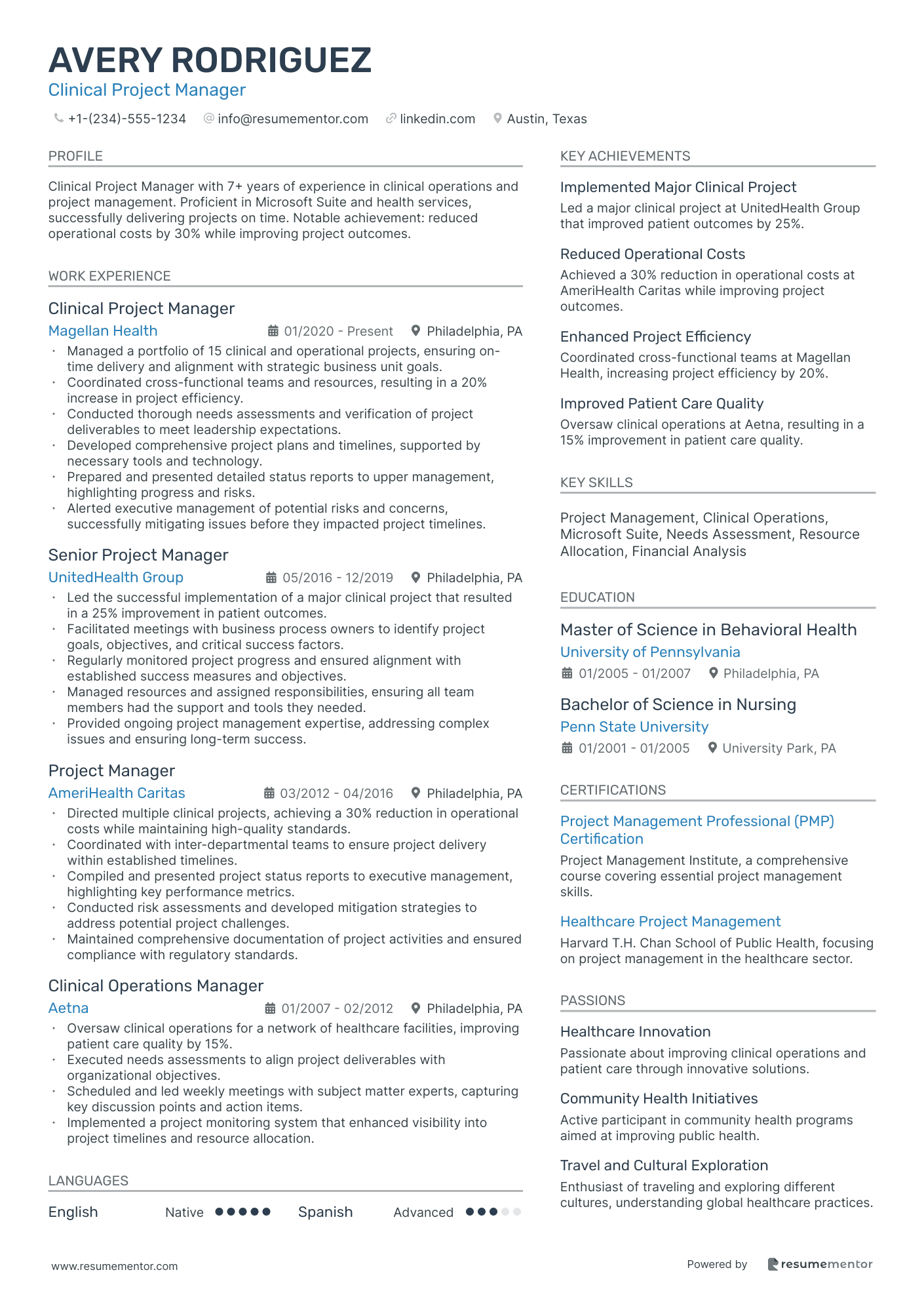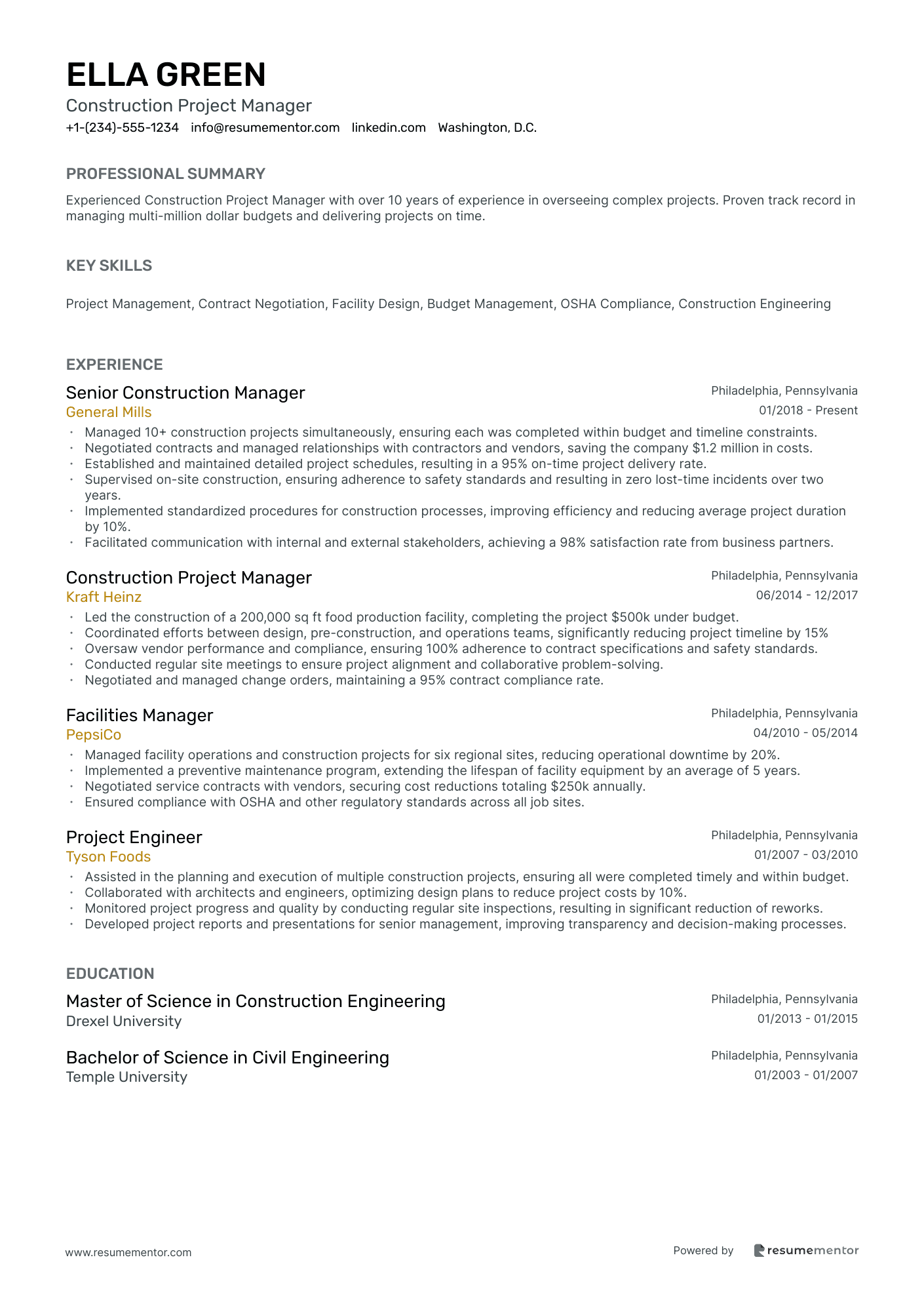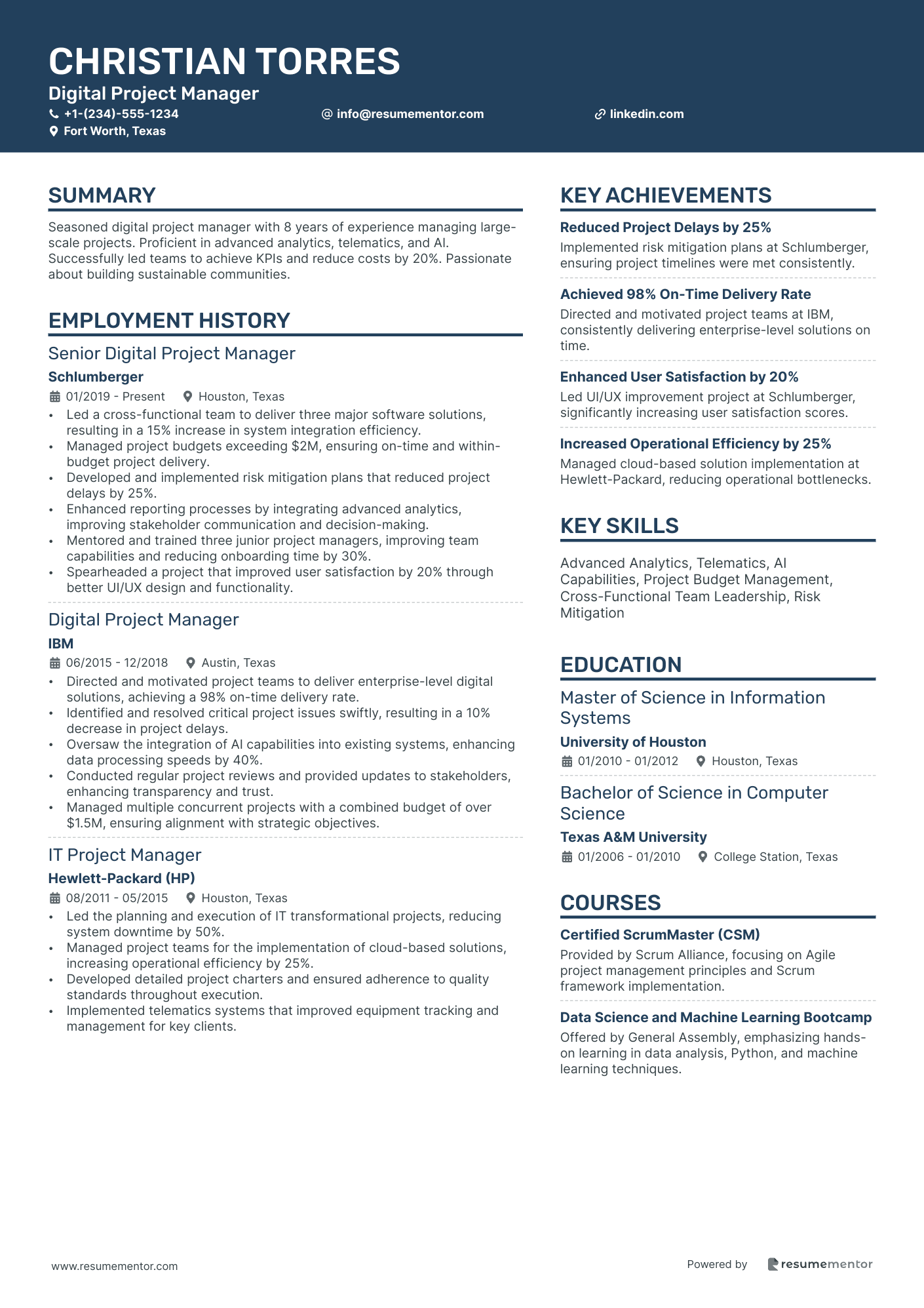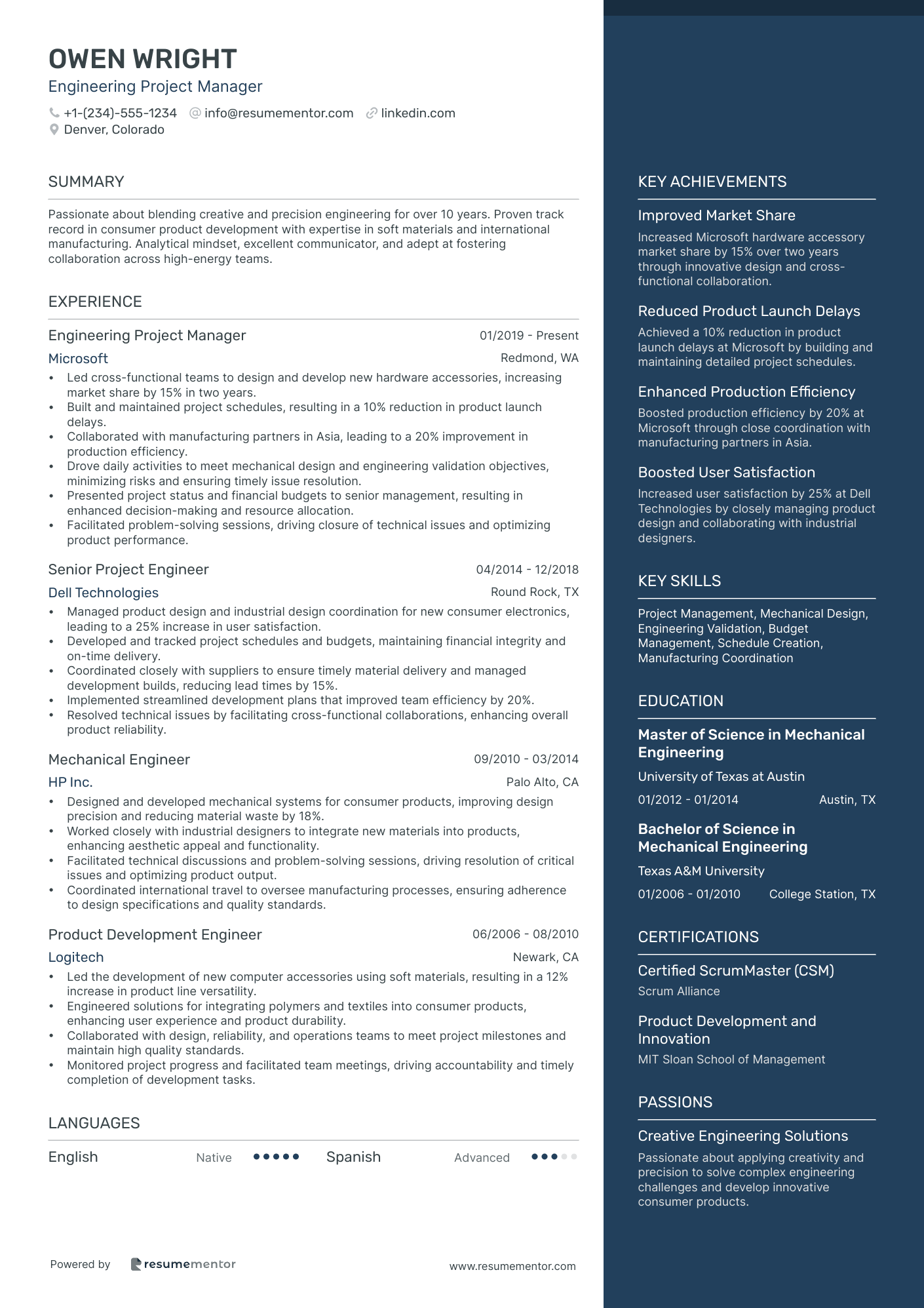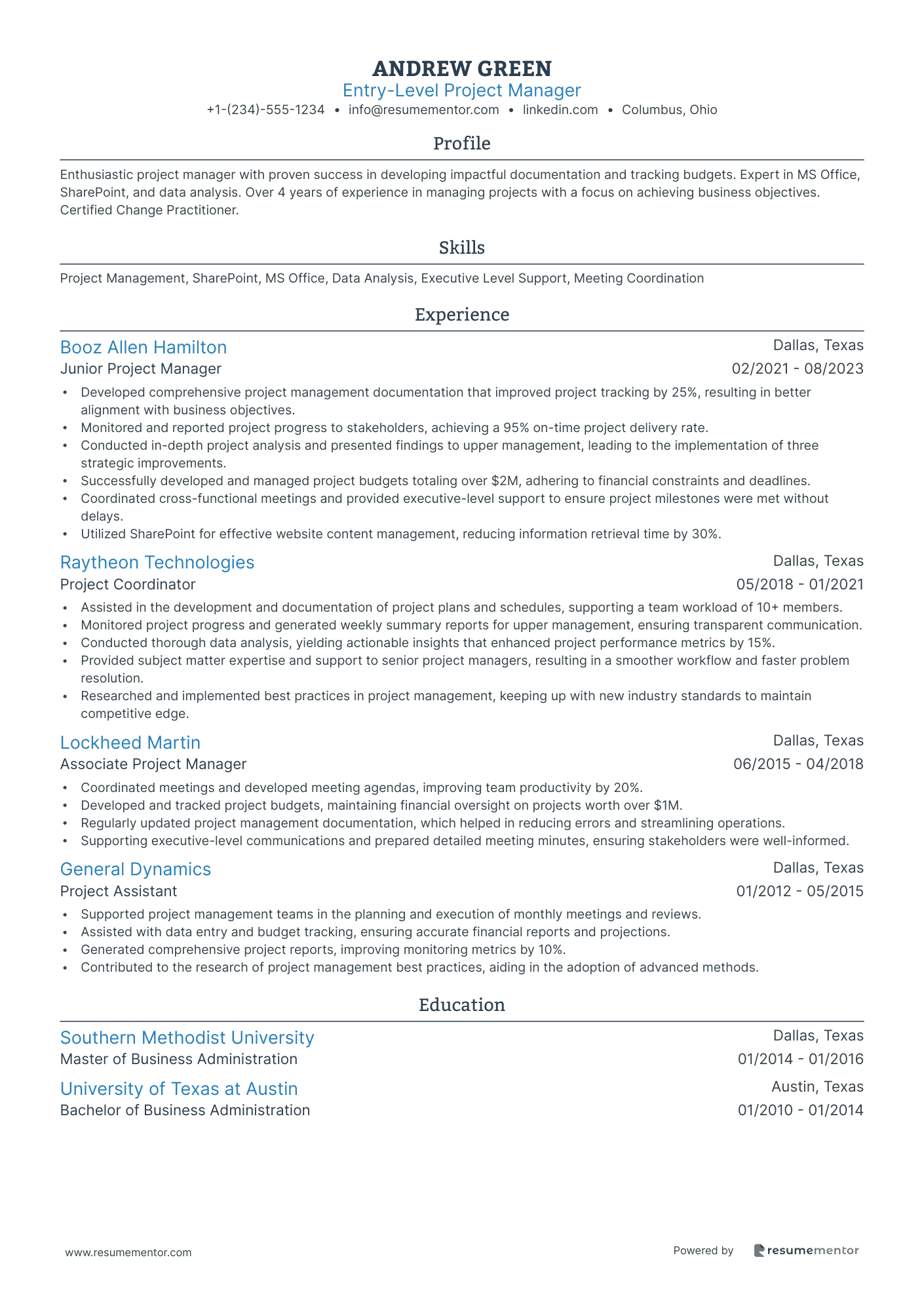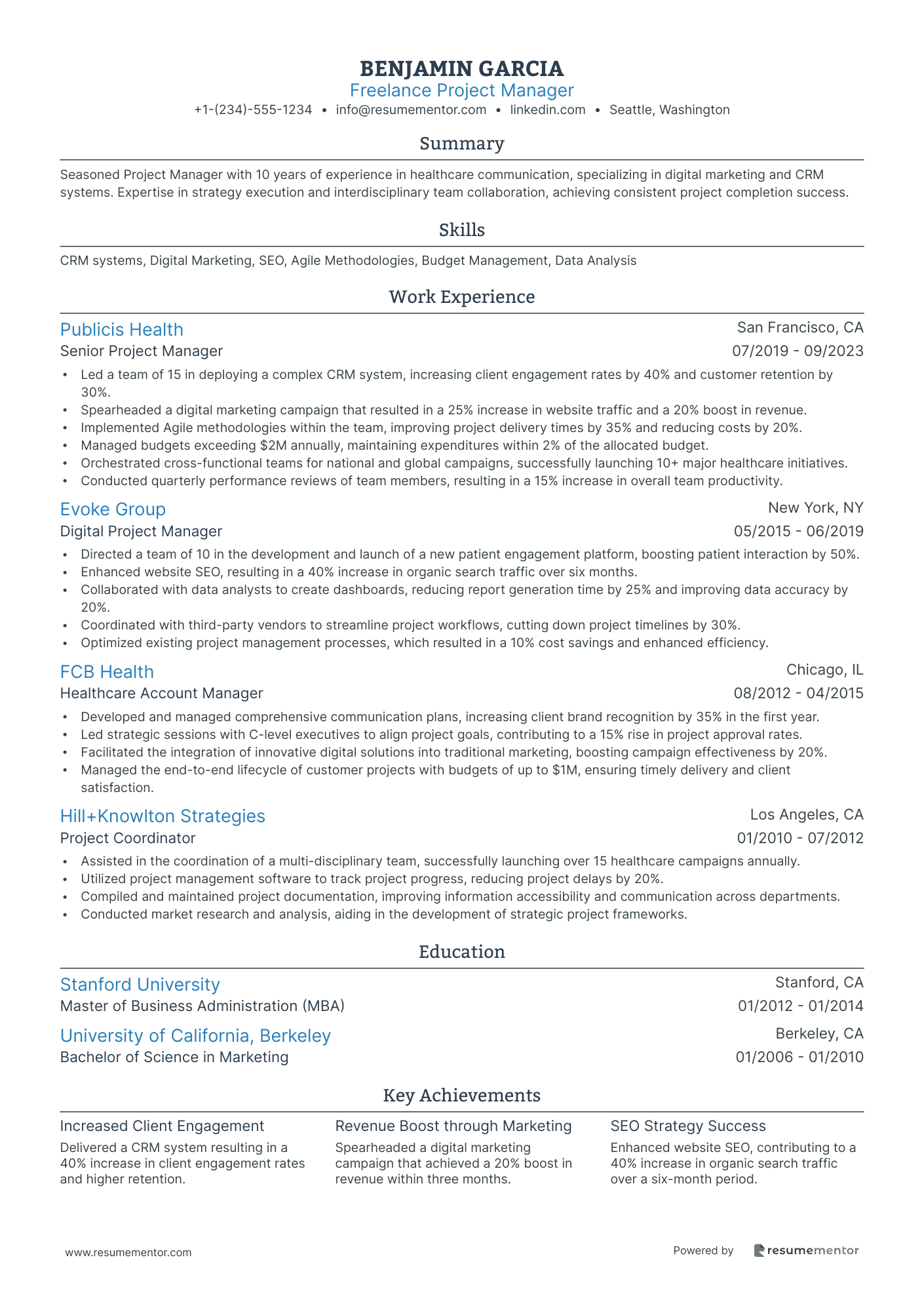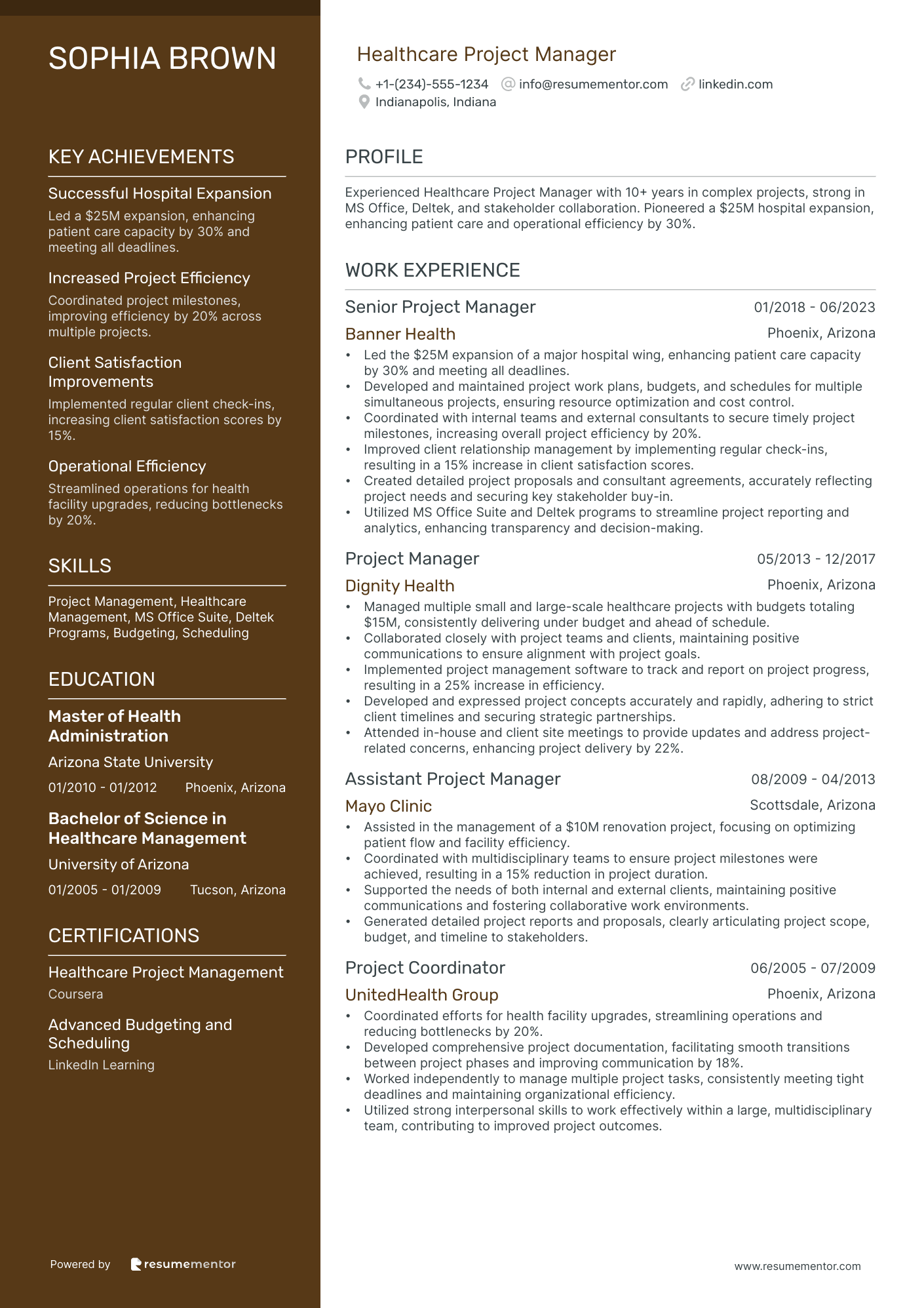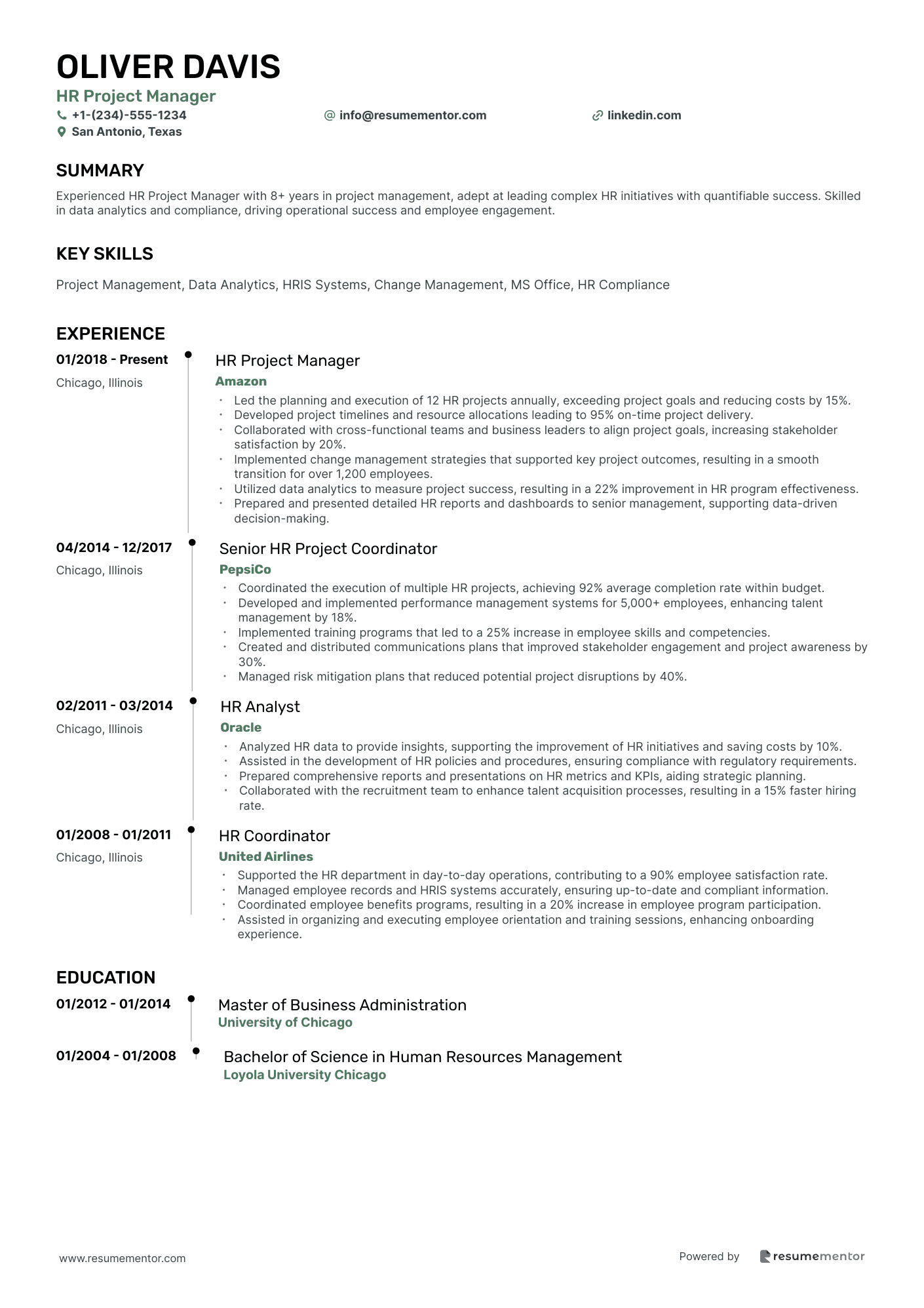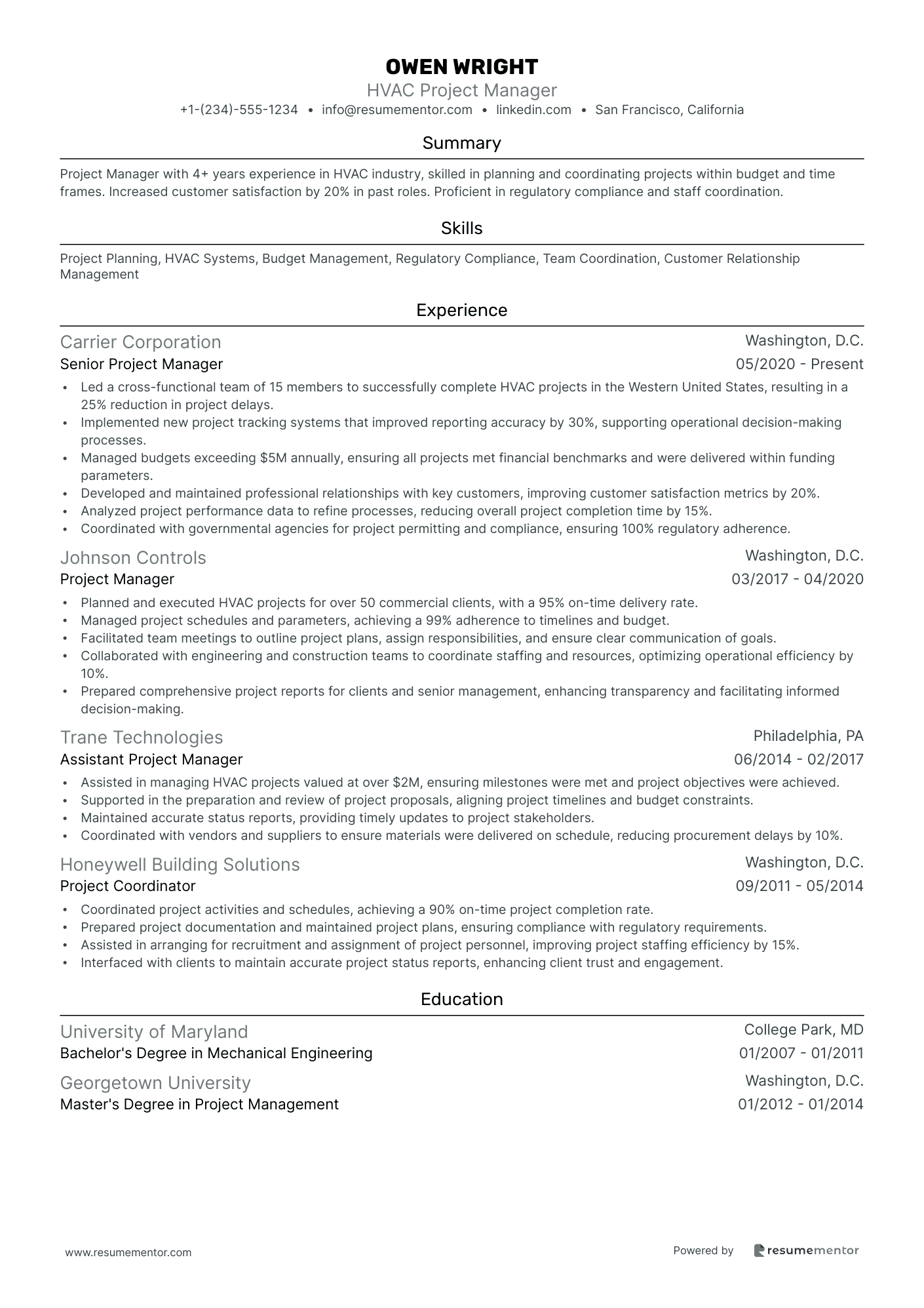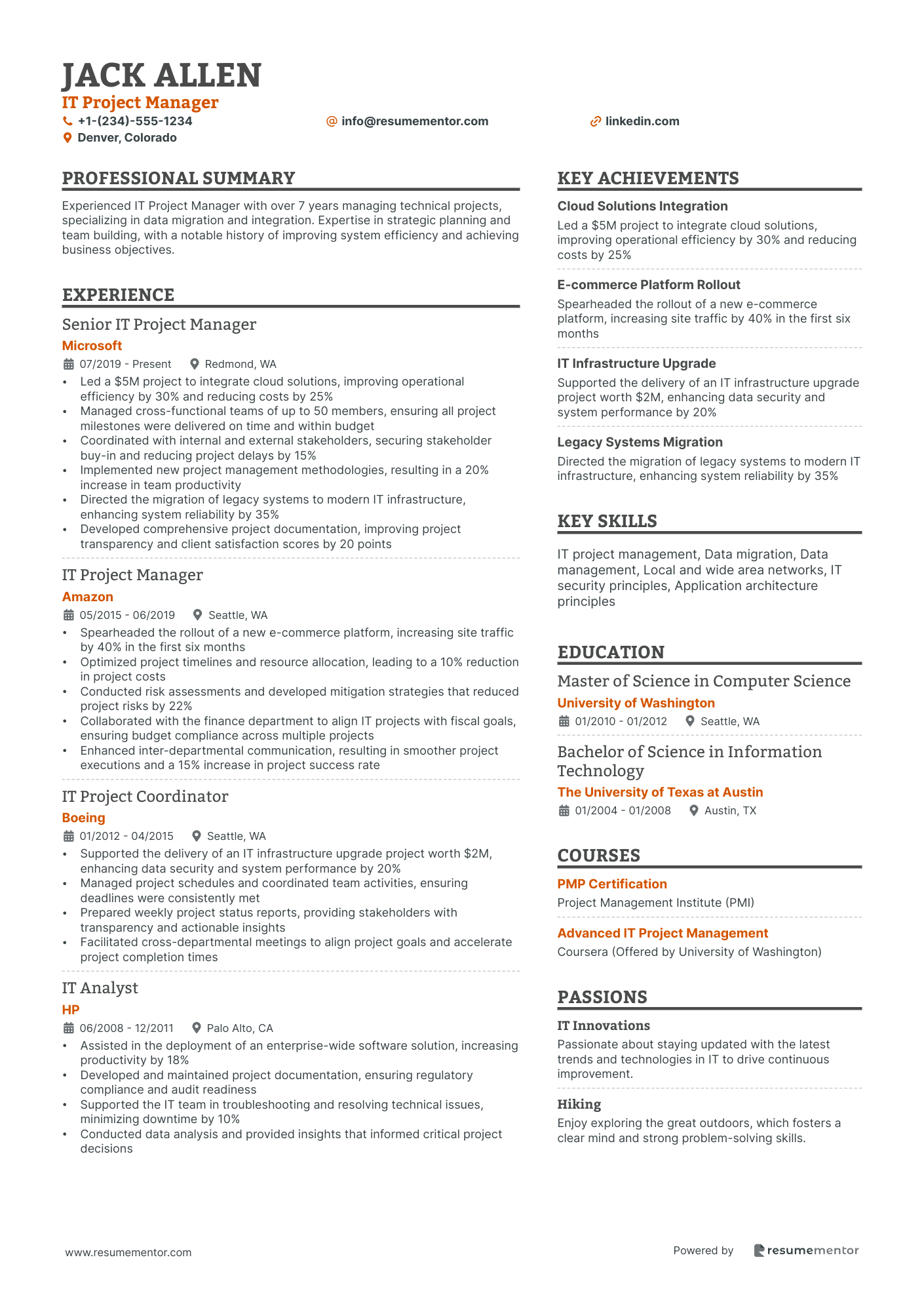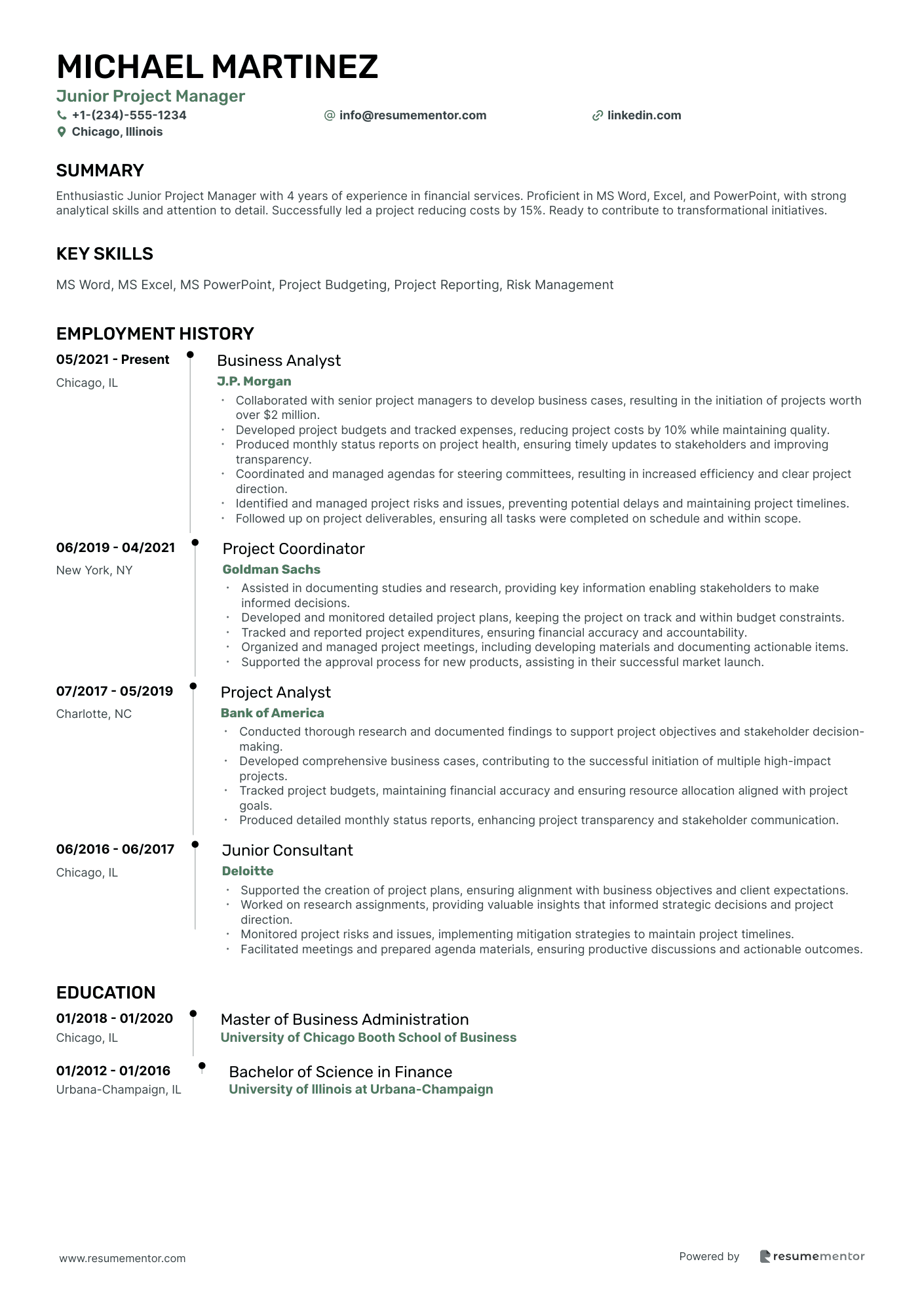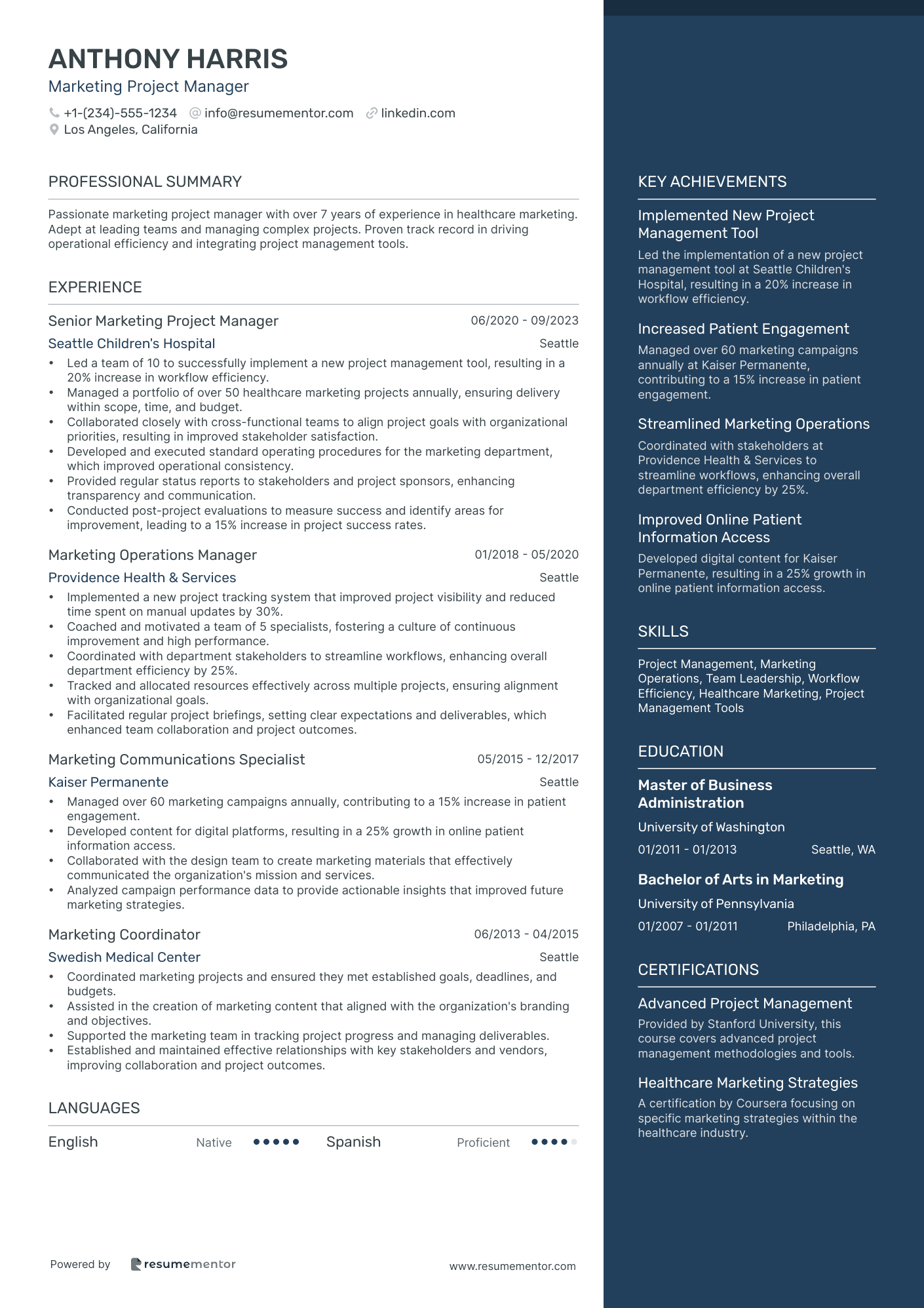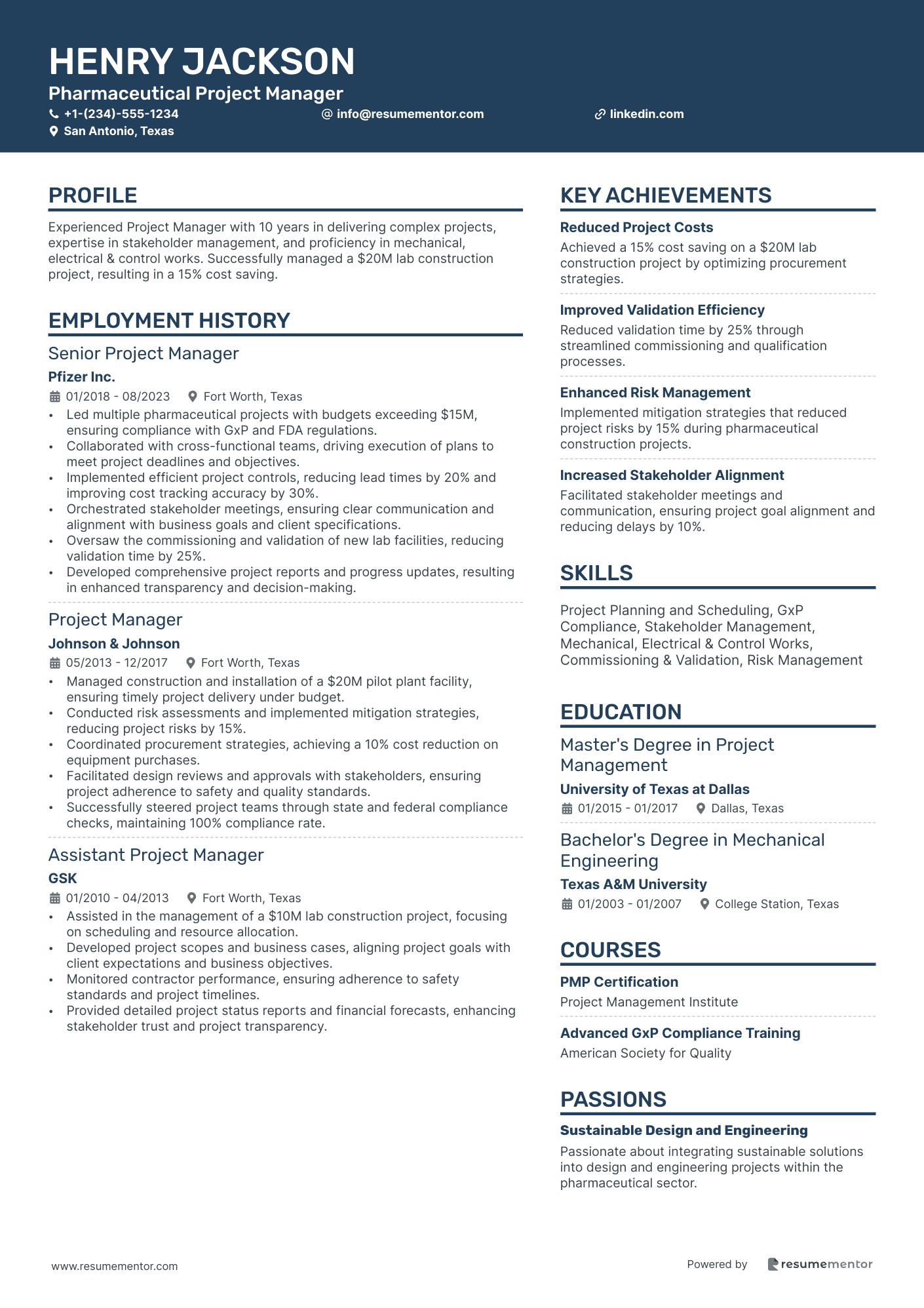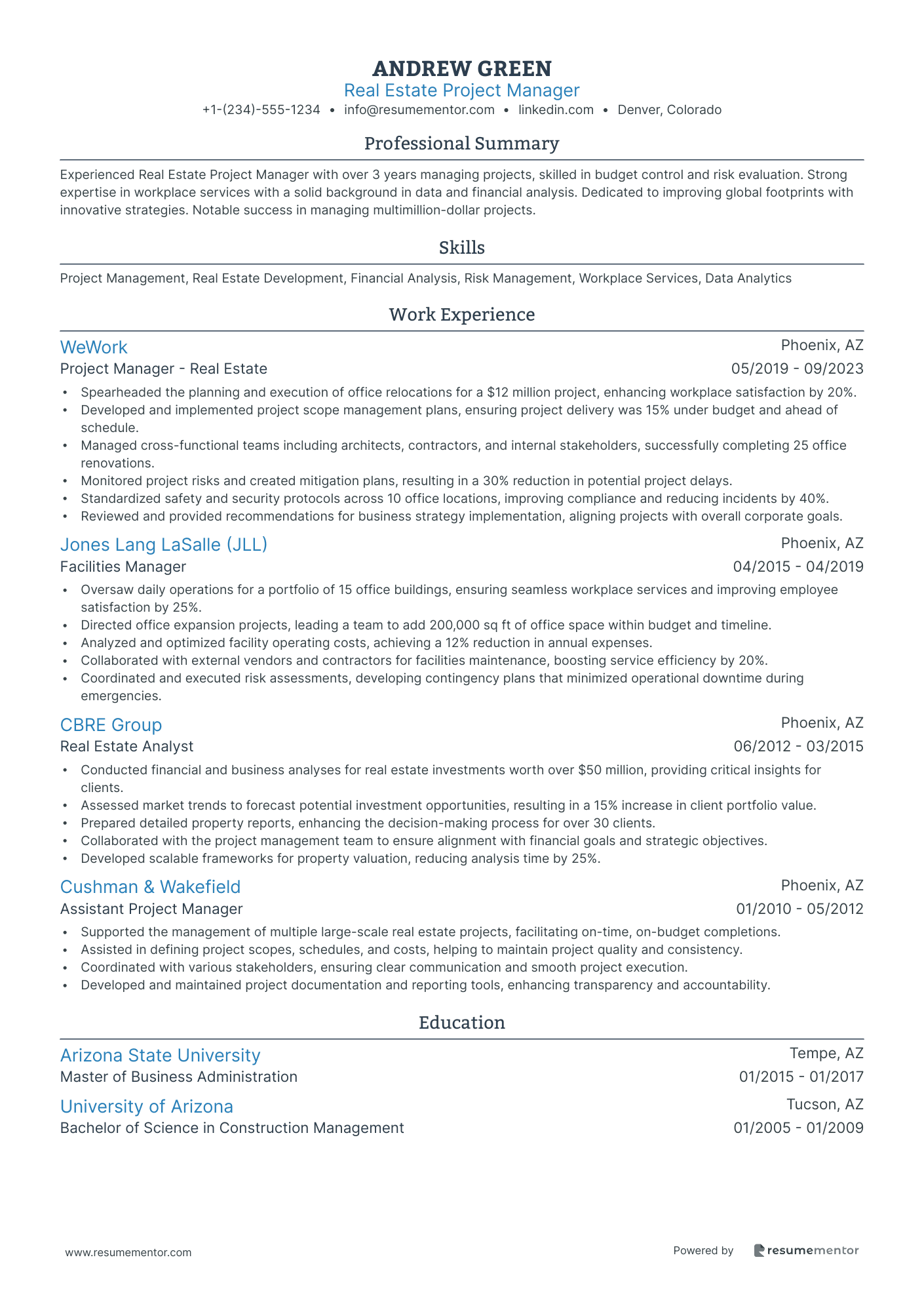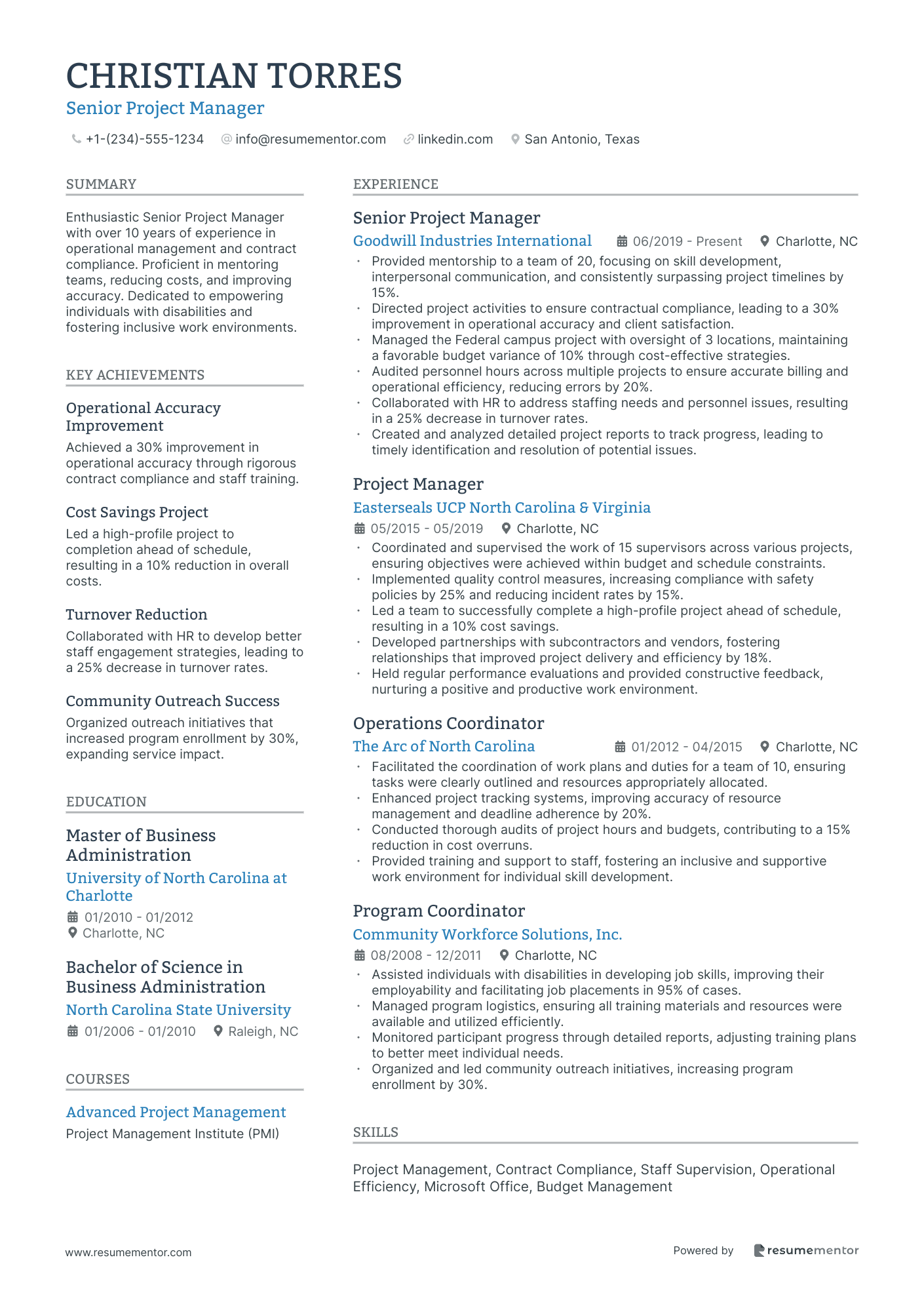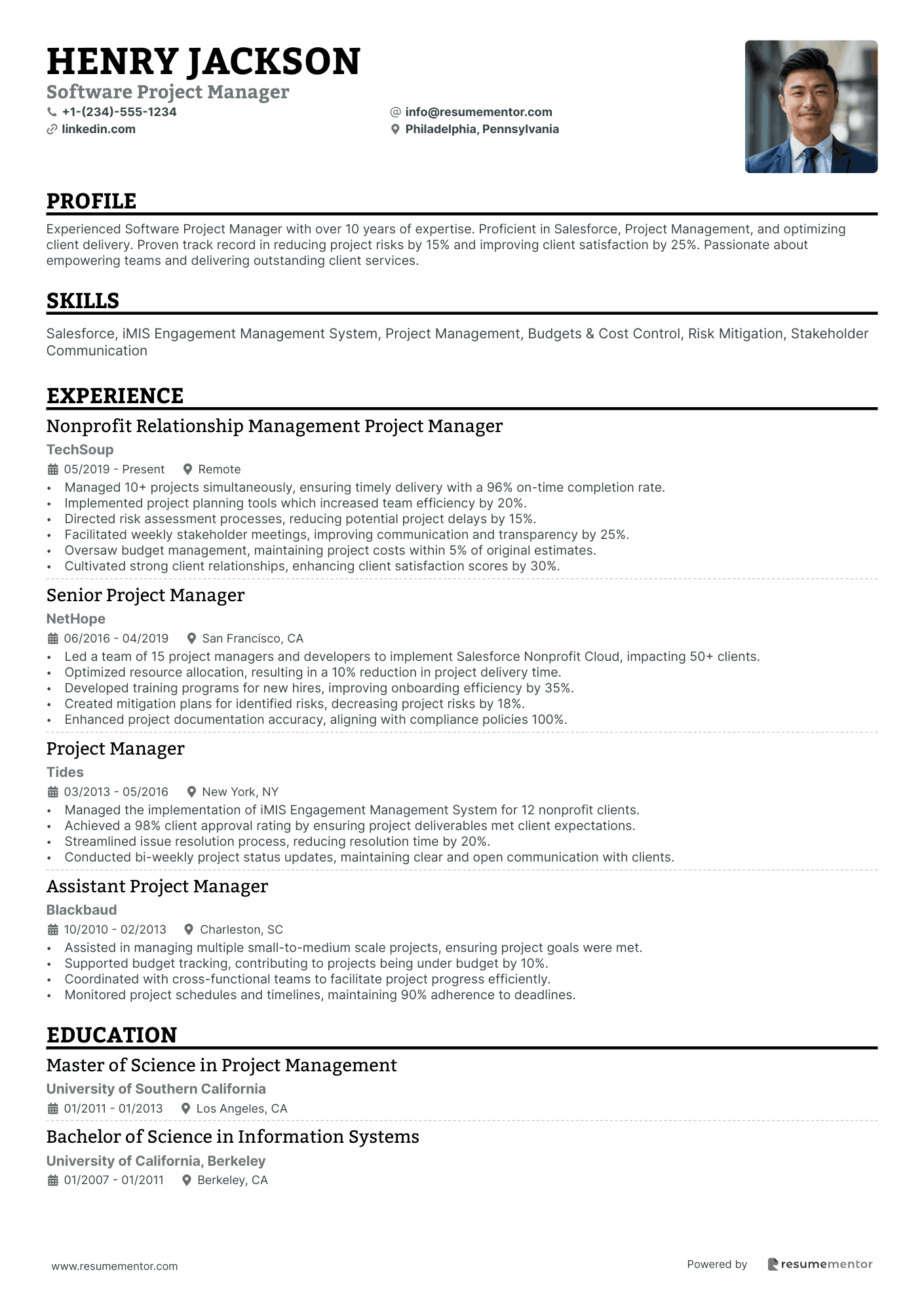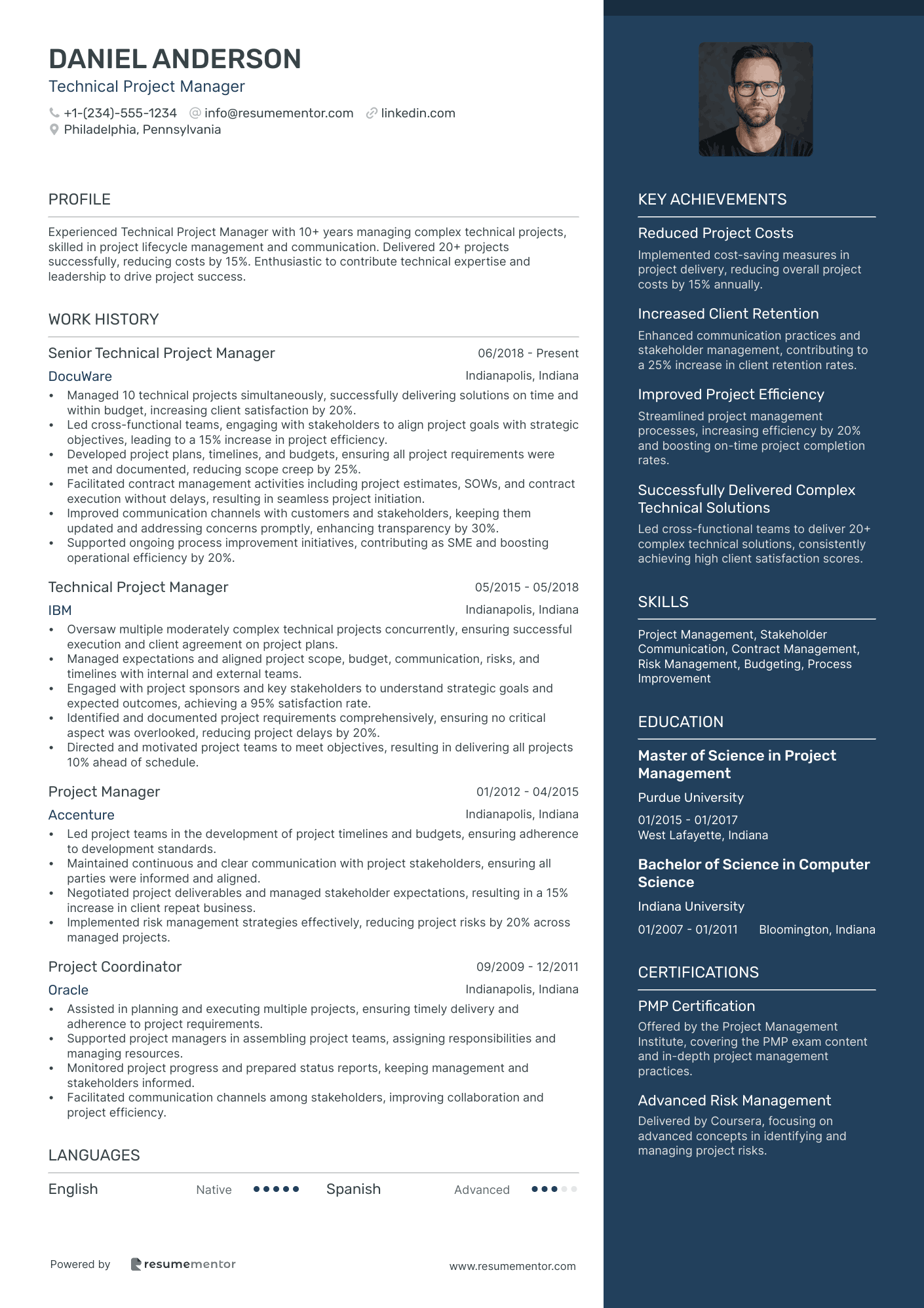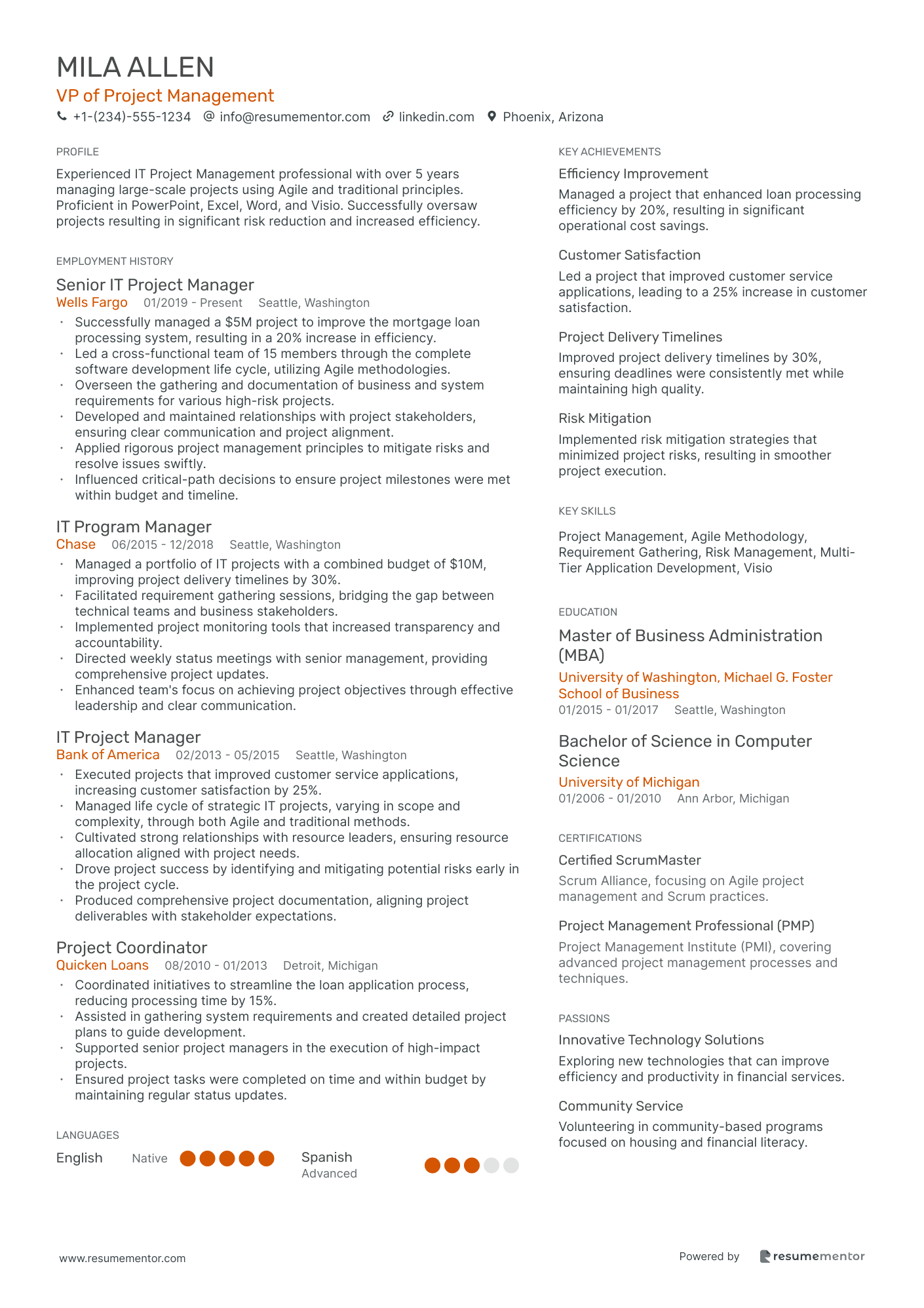22+ Project Management Resume Examples

Jul 18, 2024
|
12 min read
Mastering the art of the project management resume: your blueprint to landing the job
Rated by 348 people

Account Project Manager resume sample
- •Led cross-functional teams on projects resulting in a 20% reduction in production costs.
- •Coordinated with marketing and R&I to drive new innovations aligned with market trends.
- •Improved quality standards by implementing enhanced quality control processes, reducing defects by 15%.
- •Managed client relationships and acted as a primary point of contact, enhancing client satisfaction by 25%.
- •Introduced inventory management processes, decreasing excess inventory by 18%.
- •Developed and presented status reports to executive stakeholders, ensuring projects remained on track.
- •Collaborated with external customers and internal departments to deliver custom skincare products on time.
- •Monitored risks and developed mitigation plans, minimizing impact on project timelines.
- •Reviewed project trackers and reports to identify gaps, reducing operational disruption by 12%.
- •Enhanced brand portfolios by identifying and executing new product opportunities.
- •Mentored junior team members to build a stronger, more efficient project team.
- •Supported the development, production, and delivery of personal care products according to customer requirements.
- •Acted as a liaison between marketing and R&I teams to ensure project alignment.
- •Regularly reviewed inventory levels and initiated inventory management processes.
- •Validated new products and customers by aligning production constraints and capacity with customer requirements.
- •Supervised the production team to ensure the timely and high-quality delivery of products.
- •Conducted quality assessments, ensuring compliance with QC standards.
- •Managed daily production schedules to meet customer demands efficiently.
- •Initiated process improvements that increased production efficiency by 10%.
Agile Project Manager resume sample
- •Led cross-functional teams to deliver 12 high-profile projects, consistently meeting 95% of deadlines and budget constraints.
- •Streamlined workflow processes using Asana and Notion resulting in a 30% improvement in project delivery times.
- •Managed $5 million budget portfolio, providing detailed financial reports to stakeholders and ensuring accurate financial forecasting.
- •Conducted risk assessments and mitigation planning, reducing project risks by 25% through proactive management.
- •Collaborated with legal and operational teams to negotiate and manage vendor contracts, achieving a 15% cost reduction.
- •Facilitated over 50 planning and review meetings, ensuring team alignment and clear project objectives.
- •Guided the development and launch of an enterprise SaaS product, achieving a 20% higher adoption rate than projected.
- •Implemented Airtable for project tracking, enhancing project transparency and tracking efficiency by 35%.
- •Oversaw project budgeting and financial analysis, coming in under budget by 18% through effective cost management.
- •Facilitated stakeholder engagement sessions, improving interdepartmental collaboration and communication channels.
- •Developed comprehensive project documentation including roadmaps, timelines, and deliverables for complex projects.
- •Managed the end-to-end delivery of 8 technology projects, meeting 100% of client requirements and quality standards.
- •Leveraged Figma for project planning and coordination, enhancing team collaboration and project visualization by 25%.
- •Provided insightful budget reports and financial planning to stakeholders, facilitating informed decision-making.
- •Conducted regular project status reviews, proactively identifying potential risks and keeping all parties informed.
- •Established and maintained strong relationships with internal and external stakeholders, fostering an environment of trust and collaboration.
- •Assisted in the management of project timelines and deliverables for 10+ concurrent projects, ensuring timely completions.
- •Supported budgeting and financial tracking processes, contributing to a 10% reduction in project costs.
- •Developed informative and engaging slide decks for stakeholder presentations, effectively communicating project progress.
- •Collaborated closely with product managers to define project scopes and detailed work plans, aligning with business objectives.
Assistant Project Manager resume sample
- •Managed project budget control which resulted in a 10% reduction in project overhead costs.
- •Supervised and trained a team of 4 junior project engineers, improving their efficiency by 25%.
- •Oversaw and expedited project billings, leading to a 15% decrease in payment processing time.
- •Developed and implemented detailed project procedures for increased construction site safety protocols.
- •Estimated and negotiated change orders worth over $1.5 million in project scope adjustments.
- •Reviewed construction plans regularly to ensure completeness and accuracy, avoiding potential delays.
- •Maintained cost control ledgers, ensuring project costs stayed within 5% of initial budget.
- •Prepared detailed billings and expedited payments to sub-contractors, reducing payment turnaround by 20%.
- •Set up and managed all aspects of the CMiC system, streamlining project documentation.
- •Prepared bid packages, solicited, and evaluated over 30 bids for various project components.
- •Conducted field inspections to ensure compliance with plans and specifications, leading to zero compliance issues.
- •Assisted project manager in overseeing day-to-day construction operations, contributing to project milestones being met.
- •Monitored project progress and produced daily reports, enhancing project transparency and communication.
- •Assisted in the preparation and negotiation of change orders valued at $500,000, resulting in on-time project adjustments.
- •Reviewed subcontractor work for adherence to project specifications, reducing rework by 15%.
Clinical Project Manager resume sample
- •Managed a portfolio of 15 clinical and operational projects, ensuring on-time delivery and alignment with strategic business unit goals.
- •Coordinated cross-functional teams and resources, resulting in a 20% increase in project efficiency.
- •Conducted thorough needs assessments and verification of project deliverables to meet leadership expectations.
- •Developed comprehensive project plans and timelines, supported by necessary tools and technology.
- •Prepared and presented detailed status reports to upper management, highlighting progress and risks.
- •Alerted executive management of potential risks and concerns, successfully mitigating issues before they impacted project timelines.
- •Led the successful implementation of a major clinical project that resulted in a 25% improvement in patient outcomes.
- •Facilitated meetings with business process owners to identify project goals, objectives, and critical success factors.
- •Regularly monitored project progress and ensured alignment with established success measures and objectives.
- •Managed resources and assigned responsibilities, ensuring all team members had the support and tools they needed.
- •Provided ongoing project management expertise, addressing complex issues and ensuring long-term success.
- •Directed multiple clinical projects, achieving a 30% reduction in operational costs while maintaining high-quality standards.
- •Coordinated with inter-departmental teams to ensure project delivery within established timelines.
- •Compiled and presented project status reports to executive management, highlighting key performance metrics.
- •Conducted risk assessments and developed mitigation strategies to address potential project challenges.
- •Maintained comprehensive documentation of project activities and ensured compliance with regulatory standards.
- •Oversaw clinical operations for a network of healthcare facilities, improving patient care quality by 15%.
- •Executed needs assessments to align project deliverables with organizational objectives.
- •Scheduled and led weekly meetings with subject matter experts, capturing key discussion points and action items.
- •Implemented a project monitoring system that enhanced visibility into project timelines and resource allocation.
Construction Project Manager resume sample
- •Managed 10+ construction projects simultaneously, ensuring each was completed within budget and timeline constraints.
- •Negotiated contracts and managed relationships with contractors and vendors, saving the company $1.2 million in costs.
- •Established and maintained detailed project schedules, resulting in a 95% on-time project delivery rate.
- •Supervised on-site construction, ensuring adherence to safety standards and resulting in zero lost-time incidents over two years.
- •Implemented standardized procedures for construction processes, improving efficiency and reducing average project duration by 10%.
- •Facilitated communication with internal and external stakeholders, achieving a 98% satisfaction rate from business partners.
- •Led the construction of a 200,000 sq ft food production facility, completing the project $500k under budget.
- •Coordinated efforts between design, pre-construction, and operations teams, significantly reducing project timeline by 15%
- •Oversaw vendor performance and compliance, ensuring 100% adherence to contract specifications and safety standards.
- •Conducted regular site meetings to ensure project alignment and collaborative problem-solving.
- •Negotiated and managed change orders, maintaining a 95% contract compliance rate.
- •Managed facility operations and construction projects for six regional sites, reducing operational downtime by 20%.
- •Implemented a preventive maintenance program, extending the lifespan of facility equipment by an average of 5 years.
- •Negotiated service contracts with vendors, securing cost reductions totaling $250k annually.
- •Ensured compliance with OSHA and other regulatory standards across all job sites.
- •Assisted in the planning and execution of multiple construction projects, ensuring all were completed timely and within budget.
- •Collaborated with architects and engineers, optimizing design plans to reduce project costs by 10%.
- •Monitored project progress and quality by conducting regular site inspections, resulting in significant reduction of reworks.
- •Developed project reports and presentations for senior management, improving transparency and decision-making processes.
Digital Project Manager resume sample
- •Led a cross-functional team to deliver three major software solutions, resulting in a 15% increase in system integration efficiency.
- •Managed project budgets exceeding $2M, ensuring on-time and within-budget project delivery.
- •Developed and implemented risk mitigation plans that reduced project delays by 25%.
- •Enhanced reporting processes by integrating advanced analytics, improving stakeholder communication and decision-making.
- •Mentored and trained three junior project managers, improving team capabilities and reducing onboarding time by 30%.
- •Spearheaded a project that improved user satisfaction by 20% through better UI/UX design and functionality.
- •Directed and motivated project teams to deliver enterprise-level digital solutions, achieving a 98% on-time delivery rate.
- •Identified and resolved critical project issues swiftly, resulting in a 10% decrease in project delays.
- •Oversaw the integration of AI capabilities into existing systems, enhancing data processing speeds by 40%.
- •Conducted regular project reviews and provided updates to stakeholders, enhancing transparency and trust.
- •Managed multiple concurrent projects with a combined budget of over $1.5M, ensuring alignment with strategic objectives.
- •Led the planning and execution of IT transformational projects, reducing system downtime by 50%.
- •Managed project teams for the implementation of cloud-based solutions, increasing operational efficiency by 25%.
- •Developed detailed project charters and ensured adherence to quality standards throughout execution.
- •Implemented telematics systems that improved equipment tracking and management for key clients.
- •Oversaw the development and deployment of desktop applications used by 500,000+ global users.
- •Coordinated cross-departmental efforts to ensure seamless integration of new functionalities.
- •Implemented performance metrics tracking, leading to a 20% improvement in project delivery speed.
- •Developed contingency plans and managed project risks, resulting in minimal project disruptions.
Engineering Project Manager resume sample
- •Led cross-functional teams to design and develop new hardware accessories, increasing market share by 15% in two years.
- •Built and maintained project schedules, resulting in a 10% reduction in product launch delays.
- •Collaborated with manufacturing partners in Asia, leading to a 20% improvement in production efficiency.
- •Drove daily activities to meet mechanical design and engineering validation objectives, minimizing risks and ensuring timely issue resolution.
- •Presented project status and financial budgets to senior management, resulting in enhanced decision-making and resource allocation.
- •Facilitated problem-solving sessions, driving closure of technical issues and optimizing product performance.
- •Managed product design and industrial design coordination for new consumer electronics, leading to a 25% increase in user satisfaction.
- •Developed and tracked project schedules and budgets, maintaining financial integrity and on-time delivery.
- •Coordinated closely with suppliers to ensure timely material delivery and managed development builds, reducing lead times by 15%.
- •Implemented streamlined development plans that improved team efficiency by 20%.
- •Resolved technical issues by facilitating cross-functional collaborations, enhancing overall product reliability.
- •Designed and developed mechanical systems for consumer products, improving design precision and reducing material waste by 18%.
- •Worked closely with industrial designers to integrate new materials into products, enhancing aesthetic appeal and functionality.
- •Facilitated technical discussions and problem-solving sessions, driving resolution of critical issues and optimizing product output.
- •Coordinated international travel to oversee manufacturing processes, ensuring adherence to design specifications and quality standards.
- •Led the development of new computer accessories using soft materials, resulting in a 12% increase in product line versatility.
- •Engineered solutions for integrating polymers and textiles into consumer products, enhancing user experience and product durability.
- •Collaborated with design, reliability, and operations teams to meet project milestones and maintain high quality standards.
- •Monitored project progress and facilitated team meetings, driving accountability and timely completion of development tasks.
Entry-Level Project Manager resume sample
- •Developed comprehensive project management documentation that improved project tracking by 25%, resulting in better alignment with business objectives.
- •Monitored and reported project progress to stakeholders, achieving a 95% on-time project delivery rate.
- •Conducted in-depth project analysis and presented findings to upper management, leading to the implementation of three strategic improvements.
- •Successfully developed and managed project budgets totaling over $2M, adhering to financial constraints and deadlines.
- •Coordinated cross-functional meetings and provided executive-level support to ensure project milestones were met without delays.
- •Utilized SharePoint for effective website content management, reducing information retrieval time by 30%.
- •Assisted in the development and documentation of project plans and schedules, supporting a team workload of 10+ members.
- •Monitored project progress and generated weekly summary reports for upper management, ensuring transparent communication.
- •Conducted thorough data analysis, yielding actionable insights that enhanced project performance metrics by 15%.
- •Provided subject matter expertise and support to senior project managers, resulting in a smoother workflow and faster problem resolution.
- •Researched and implemented best practices in project management, keeping up with new industry standards to maintain competitive edge.
- •Coordinated meetings and developed meeting agendas, improving team productivity by 20%.
- •Developed and tracked project budgets, maintaining financial oversight on projects worth over $1M.
- •Regularly updated project management documentation, which helped in reducing errors and streamlining operations.
- •Supporting executive-level communications and prepared detailed meeting minutes, ensuring stakeholders were well-informed.
- •Supported project management teams in the planning and execution of monthly meetings and reviews.
- •Assisted with data entry and budget tracking, ensuring accurate financial reports and projections.
- •Generated comprehensive project reports, improving monitoring metrics by 10%.
- •Contributed to the research of project management best practices, aiding in the adoption of advanced methods.
Freelance Project Manager resume sample
- •Led a team of 15 in deploying a complex CRM system, increasing client engagement rates by 40% and customer retention by 30%.
- •Spearheaded a digital marketing campaign that resulted in a 25% increase in website traffic and a 20% boost in revenue.
- •Implemented Agile methodologies within the team, improving project delivery times by 35% and reducing costs by 20%.
- •Managed budgets exceeding $2M annually, maintaining expenditures within 2% of the allocated budget.
- •Orchestrated cross-functional teams for national and global campaigns, successfully launching 10+ major healthcare initiatives.
- •Conducted quarterly performance reviews of team members, resulting in a 15% increase in overall team productivity.
- •Directed a team of 10 in the development and launch of a new patient engagement platform, boosting patient interaction by 50%.
- •Enhanced website SEO, resulting in a 40% increase in organic search traffic over six months.
- •Collaborated with data analysts to create dashboards, reducing report generation time by 25% and improving data accuracy by 20%.
- •Coordinated with third-party vendors to streamline project workflows, cutting down project timelines by 30%.
- •Optimized existing project management processes, which resulted in a 10% cost savings and enhanced efficiency.
- •Developed and managed comprehensive communication plans, increasing client brand recognition by 35% in the first year.
- •Led strategic sessions with C-level executives to align project goals, contributing to a 15% rise in project approval rates.
- •Facilitated the integration of innovative digital solutions into traditional marketing, boosting campaign effectiveness by 20%.
- •Managed the end-to-end lifecycle of customer projects with budgets of up to $1M, ensuring timely delivery and client satisfaction.
- •Assisted in the coordination of a multi-disciplinary team, successfully launching over 15 healthcare campaigns annually.
- •Utilized project management software to track project progress, reducing project delays by 20%.
- •Compiled and maintained project documentation, improving information accessibility and communication across departments.
- •Conducted market research and analysis, aiding in the development of strategic project frameworks.
Healthcare Project Manager resume sample
- •Led the $25M expansion of a major hospital wing, enhancing patient care capacity by 30% and meeting all deadlines.
- •Developed and maintained project work plans, budgets, and schedules for multiple simultaneous projects, ensuring resource optimization and cost control.
- •Coordinated with internal teams and external consultants to secure timely project milestones, increasing overall project efficiency by 20%.
- •Improved client relationship management by implementing regular check-ins, resulting in a 15% increase in client satisfaction scores.
- •Created detailed project proposals and consultant agreements, accurately reflecting project needs and securing key stakeholder buy-in.
- •Utilized MS Office Suite and Deltek programs to streamline project reporting and analytics, enhancing transparency and decision-making.
- •Managed multiple small and large-scale healthcare projects with budgets totaling $15M, consistently delivering under budget and ahead of schedule.
- •Collaborated closely with project teams and clients, maintaining positive communications to ensure alignment with project goals.
- •Implemented project management software to track and report on project progress, resulting in a 25% increase in efficiency.
- •Developed and expressed project concepts accurately and rapidly, adhering to strict client timelines and securing strategic partnerships.
- •Attended in-house and client site meetings to provide updates and address project-related concerns, enhancing project delivery by 22%.
- •Assisted in the management of a $10M renovation project, focusing on optimizing patient flow and facility efficiency.
- •Coordinated with multidisciplinary teams to ensure project milestones were achieved, resulting in a 15% reduction in project duration.
- •Supported the needs of both internal and external clients, maintaining positive communications and fostering collaborative work environments.
- •Generated detailed project reports and proposals, clearly articulating project scope, budget, and timeline to stakeholders.
- •Coordinated efforts for health facility upgrades, streamlining operations and reducing bottlenecks by 20%.
- •Developed comprehensive project documentation, facilitating smooth transitions between project phases and improving communication by 18%.
- •Worked independently to manage multiple project tasks, consistently meeting tight deadlines and maintaining organizational efficiency.
- •Utilized strong interpersonal skills to work effectively within a large, multidisciplinary team, contributing to improved project outcomes.
HR project manager resume sample
- •Led the planning and execution of 12 HR projects annually, exceeding project goals and reducing costs by 15%.
- •Developed project timelines and resource allocations leading to 95% on-time project delivery.
- •Collaborated with cross-functional teams and business leaders to align project goals, increasing stakeholder satisfaction by 20%.
- •Implemented change management strategies that supported key project outcomes, resulting in a smooth transition for over 1,200 employees.
- •Utilized data analytics to measure project success, resulting in a 22% improvement in HR program effectiveness.
- •Prepared and presented detailed HR reports and dashboards to senior management, supporting data-driven decision-making.
- •Coordinated the execution of multiple HR projects, achieving 92% average completion rate within budget.
- •Developed and implemented performance management systems for 5,000+ employees, enhancing talent management by 18%.
- •Implemented training programs that led to a 25% increase in employee skills and competencies.
- •Created and distributed communications plans that improved stakeholder engagement and project awareness by 30%.
- •Managed risk mitigation plans that reduced potential project disruptions by 40%.
- •Analyzed HR data to provide insights, supporting the improvement of HR initiatives and saving costs by 10%.
- •Assisted in the development of HR policies and procedures, ensuring compliance with regulatory requirements.
- •Prepared comprehensive reports and presentations on HR metrics and KPIs, aiding strategic planning.
- •Collaborated with the recruitment team to enhance talent acquisition processes, resulting in a 15% faster hiring rate.
- •Supported the HR department in day-to-day operations, contributing to a 90% employee satisfaction rate.
- •Managed employee records and HRIS systems accurately, ensuring up-to-date and compliant information.
- •Coordinated employee benefits programs, resulting in a 20% increase in employee program participation.
- •Assisted in organizing and executing employee orientation and training sessions, enhancing onboarding experience.
HVAC project manager resume sample
- •Led a cross-functional team of 15 members to successfully complete HVAC projects in the Western United States, resulting in a 25% reduction in project delays.
- •Implemented new project tracking systems that improved reporting accuracy by 30%, supporting operational decision-making processes.
- •Managed budgets exceeding $5M annually, ensuring all projects met financial benchmarks and were delivered within funding parameters.
- •Developed and maintained professional relationships with key customers, improving customer satisfaction metrics by 20%.
- •Analyzed project performance data to refine processes, reducing overall project completion time by 15%.
- •Coordinated with governmental agencies for project permitting and compliance, ensuring 100% regulatory adherence.
- •Planned and executed HVAC projects for over 50 commercial clients, with a 95% on-time delivery rate.
- •Managed project schedules and parameters, achieving a 99% adherence to timelines and budget.
- •Facilitated team meetings to outline project plans, assign responsibilities, and ensure clear communication of goals.
- •Collaborated with engineering and construction teams to coordinate staffing and resources, optimizing operational efficiency by 10%.
- •Prepared comprehensive project reports for clients and senior management, enhancing transparency and facilitating informed decision-making.
- •Assisted in managing HVAC projects valued at over $2M, ensuring milestones were met and project objectives were achieved.
- •Supported in the preparation and review of project proposals, aligning project timelines and budget constraints.
- •Maintained accurate status reports, providing timely updates to project stakeholders.
- •Coordinated with vendors and suppliers to ensure materials were delivered on schedule, reducing procurement delays by 10%.
- •Coordinated project activities and schedules, achieving a 90% on-time project completion rate.
- •Prepared project documentation and maintained project plans, ensuring compliance with regulatory requirements.
- •Assisted in arranging for recruitment and assignment of project personnel, improving project staffing efficiency by 15%.
- •Interfaced with clients to maintain accurate project status reports, enhancing client trust and engagement.
IT project manager resume sample
- •Led a $5M project to integrate cloud solutions, improving operational efficiency by 30% and reducing costs by 25%
- •Managed cross-functional teams of up to 50 members, ensuring all project milestones were delivered on time and within budget
- •Coordinated with internal and external stakeholders, securing stakeholder buy-in and reducing project delays by 15%
- •Implemented new project management methodologies, resulting in a 20% increase in team productivity
- •Directed the migration of legacy systems to modern IT infrastructure, enhancing system reliability by 35%
- •Developed comprehensive project documentation, improving project transparency and client satisfaction scores by 20 points
- •Spearheaded the rollout of a new e-commerce platform, increasing site traffic by 40% in the first six months
- •Optimized project timelines and resource allocation, leading to a 10% reduction in project costs
- •Conducted risk assessments and developed mitigation strategies that reduced project risks by 22%
- •Collaborated with the finance department to align IT projects with fiscal goals, ensuring budget compliance across multiple projects
- •Enhanced inter-departmental communication, resulting in smoother project executions and a 15% increase in project success rate
- •Supported the delivery of an IT infrastructure upgrade project worth $2M, enhancing data security and system performance by 20%
- •Managed project schedules and coordinated team activities, ensuring deadlines were consistently met
- •Prepared weekly project status reports, providing stakeholders with transparency and actionable insights
- •Facilitated cross-departmental meetings to align project goals and accelerate project completion times
- •Assisted in the deployment of an enterprise-wide software solution, increasing productivity by 18%
- •Developed and maintained project documentation, ensuring regulatory compliance and audit readiness
- •Supported the IT team in troubleshooting and resolving technical issues, minimizing downtime by 10%
- •Conducted data analysis and provided insights that informed critical project decisions
Junior Project Manager resume sample
- •Collaborated with senior project managers to develop business cases, resulting in the initiation of projects worth over $2 million.
- •Developed project budgets and tracked expenses, reducing project costs by 10% while maintaining quality.
- •Produced monthly status reports on project health, ensuring timely updates to stakeholders and improving transparency.
- •Coordinated and managed agendas for steering committees, resulting in increased efficiency and clear project direction.
- •Identified and managed project risks and issues, preventing potential delays and maintaining project timelines.
- •Followed up on project deliverables, ensuring all tasks were completed on schedule and within scope.
- •Assisted in documenting studies and research, providing key information enabling stakeholders to make informed decisions.
- •Developed and monitored detailed project plans, keeping the project on track and within budget constraints.
- •Tracked and reported project expenditures, ensuring financial accuracy and accountability.
- •Organized and managed project meetings, including developing materials and documenting actionable items.
- •Supported the approval process for new products, assisting in their successful market launch.
- •Conducted thorough research and documented findings to support project objectives and stakeholder decision-making.
- •Developed comprehensive business cases, contributing to the successful initiation of multiple high-impact projects.
- •Tracked project budgets, maintaining financial accuracy and ensuring resource allocation aligned with project goals.
- •Produced detailed monthly status reports, enhancing project transparency and stakeholder communication.
- •Supported the creation of project plans, ensuring alignment with business objectives and client expectations.
- •Worked on research assignments, providing valuable insights that informed strategic decisions and project direction.
- •Monitored project risks and issues, implementing mitigation strategies to maintain project timelines.
- •Facilitated meetings and prepared agenda materials, ensuring productive discussions and actionable outcomes.
Marketing Project Manager resume sample
- •Led a team of 10 to successfully implement a new project management tool, resulting in a 20% increase in workflow efficiency.
- •Managed a portfolio of over 50 healthcare marketing projects annually, ensuring delivery within scope, time, and budget.
- •Collaborated closely with cross-functional teams to align project goals with organizational priorities, resulting in improved stakeholder satisfaction.
- •Developed and executed standard operating procedures for the marketing department, which improved operational consistency.
- •Provided regular status reports to stakeholders and project sponsors, enhancing transparency and communication.
- •Conducted post-project evaluations to measure success and identify areas for improvement, leading to a 15% increase in project success rates.
- •Implemented a new project tracking system that improved project visibility and reduced time spent on manual updates by 30%.
- •Coached and motivated a team of 5 specialists, fostering a culture of continuous improvement and high performance.
- •Coordinated with department stakeholders to streamline workflows, enhancing overall department efficiency by 25%.
- •Tracked and allocated resources effectively across multiple projects, ensuring alignment with organizational goals.
- •Facilitated regular project briefings, setting clear expectations and deliverables, which enhanced team collaboration and project outcomes.
- •Managed over 60 marketing campaigns annually, contributing to a 15% increase in patient engagement.
- •Developed content for digital platforms, resulting in a 25% growth in online patient information access.
- •Collaborated with the design team to create marketing materials that effectively communicated the organization's mission and services.
- •Analyzed campaign performance data to provide actionable insights that improved future marketing strategies.
- •Coordinated marketing projects and ensured they met established goals, deadlines, and budgets.
- •Assisted in the creation of marketing content that aligned with the organization's branding and objectives.
- •Supported the marketing team in tracking project progress and managing deliverables.
- •Established and maintained effective relationships with key stakeholders and vendors, improving collaboration and project outcomes.
Pharmaceutical Project Manager resume sample
- •Led multiple pharmaceutical projects with budgets exceeding $15M, ensuring compliance with GxP and FDA regulations.
- •Collaborated with cross-functional teams, driving execution of plans to meet project deadlines and objectives.
- •Implemented efficient project controls, reducing lead times by 20% and improving cost tracking accuracy by 30%.
- •Orchestrated stakeholder meetings, ensuring clear communication and alignment with business goals and client specifications.
- •Oversaw the commissioning and validation of new lab facilities, reducing validation time by 25%.
- •Developed comprehensive project reports and progress updates, resulting in enhanced transparency and decision-making.
- •Managed construction and installation of a $20M pilot plant facility, ensuring timely project delivery under budget.
- •Conducted risk assessments and implemented mitigation strategies, reducing project risks by 15%.
- •Coordinated procurement strategies, achieving a 10% cost reduction on equipment purchases.
- •Facilitated design reviews and approvals with stakeholders, ensuring project adherence to safety and quality standards.
- •Successfully steered project teams through state and federal compliance checks, maintaining 100% compliance rate.
- •Assisted in the management of a $10M lab construction project, focusing on scheduling and resource allocation.
- •Developed project scopes and business cases, aligning project goals with client expectations and business objectives.
- •Monitored contractor performance, ensuring adherence to safety standards and project timelines.
- •Provided detailed project status reports and financial forecasts, enhancing stakeholder trust and project transparency.
- •Coordinated activities for multiple design and preconstruction projects, ensuring alignment with regulatory requirements.
- •Scheduled project meetings and documented minutes, facilitating efficient communication among project teams.
- •Maintained project documentation and controls, improving access to project information and decision-making.
- •Monitored and reported on project progress, identifying potential issues and recommending solutions.
Real Estate Project Manager resume sample
- •Spearheaded the planning and execution of office relocations for a $12 million project, enhancing workplace satisfaction by 20%.
- •Developed and implemented project scope management plans, ensuring project delivery was 15% under budget and ahead of schedule.
- •Managed cross-functional teams including architects, contractors, and internal stakeholders, successfully completing 25 office renovations.
- •Monitored project risks and created mitigation plans, resulting in a 30% reduction in potential project delays.
- •Standardized safety and security protocols across 10 office locations, improving compliance and reducing incidents by 40%.
- •Reviewed and provided recommendations for business strategy implementation, aligning projects with overall corporate goals.
- •Oversaw daily operations for a portfolio of 15 office buildings, ensuring seamless workplace services and improving employee satisfaction by 25%.
- •Directed office expansion projects, leading a team to add 200,000 sq ft of office space within budget and timeline.
- •Analyzed and optimized facility operating costs, achieving a 12% reduction in annual expenses.
- •Collaborated with external vendors and contractors for facilities maintenance, boosting service efficiency by 20%.
- •Coordinated and executed risk assessments, developing contingency plans that minimized operational downtime during emergencies.
- •Conducted financial and business analyses for real estate investments worth over $50 million, providing critical insights for clients.
- •Assessed market trends to forecast potential investment opportunities, resulting in a 15% increase in client portfolio value.
- •Prepared detailed property reports, enhancing the decision-making process for over 30 clients.
- •Collaborated with the project management team to ensure alignment with financial goals and strategic objectives.
- •Developed scalable frameworks for property valuation, reducing analysis time by 25%.
- •Supported the management of multiple large-scale real estate projects, facilitating on-time, on-budget completions.
- •Assisted in defining project scopes, schedules, and costs, helping to maintain project quality and consistency.
- •Coordinated with various stakeholders, ensuring clear communication and smooth project execution.
- •Developed and maintained project documentation and reporting tools, enhancing transparency and accountability.
Senior Project Manager resume sample
- •Provided mentorship to a team of 20, focusing on skill development, interpersonal communication, and consistently surpassing project timelines by 15%.
- •Directed project activities to ensure contractual compliance, leading to a 30% improvement in operational accuracy and client satisfaction.
- •Managed the Federal campus project with oversight of 3 locations, maintaining a favorable budget variance of 10% through cost-effective strategies.
- •Audited personnel hours across multiple projects to ensure accurate billing and operational efficiency, reducing errors by 20%.
- •Collaborated with HR to address staffing needs and personnel issues, resulting in a 25% decrease in turnover rates.
- •Created and analyzed detailed project reports to track progress, leading to timely identification and resolution of potential issues.
- •Coordinated and supervised the work of 15 supervisors across various projects, ensuring objectives were achieved within budget and schedule constraints.
- •Implemented quality control measures, increasing compliance with safety policies by 25% and reducing incident rates by 15%.
- •Led a team to successfully complete a high-profile project ahead of schedule, resulting in a 10% cost savings.
- •Developed partnerships with subcontractors and vendors, fostering relationships that improved project delivery and efficiency by 18%.
- •Held regular performance evaluations and provided constructive feedback, nurturing a positive and productive work environment.
- •Facilitated the coordination of work plans and duties for a team of 10, ensuring tasks were clearly outlined and resources appropriately allocated.
- •Enhanced project tracking systems, improving accuracy of resource management and deadline adherence by 20%.
- •Conducted thorough audits of project hours and budgets, contributing to a 15% reduction in cost overruns.
- •Provided training and support to staff, fostering an inclusive and supportive work environment for individual skill development.
- •Assisted individuals with disabilities in developing job skills, improving their employability and facilitating job placements in 95% of cases.
- •Managed program logistics, ensuring all training materials and resources were available and utilized efficiently.
- •Monitored participant progress through detailed reports, adjusting training plans to better meet individual needs.
- •Organized and led community outreach initiatives, increasing program enrollment by 30%.
Software Project Manager resume sample
- •Managed 10+ projects simultaneously, ensuring timely delivery with a 96% on-time completion rate.
- •Implemented project planning tools which increased team efficiency by 20%.
- •Directed risk assessment processes, reducing potential project delays by 15%.
- •Facilitated weekly stakeholder meetings, improving communication and transparency by 25%.
- •Oversaw budget management, maintaining project costs within 5% of original estimates.
- •Cultivated strong client relationships, enhancing client satisfaction scores by 30%.
- •Led a team of 15 project managers and developers to implement Salesforce Nonprofit Cloud, impacting 50+ clients.
- •Optimized resource allocation, resulting in a 10% reduction in project delivery time.
- •Developed training programs for new hires, improving onboarding efficiency by 35%.
- •Created mitigation plans for identified risks, decreasing project risks by 18%.
- •Enhanced project documentation accuracy, aligning with compliance policies 100%.
- •Managed the implementation of iMIS Engagement Management System for 12 nonprofit clients.
- •Achieved a 98% client approval rating by ensuring project deliverables met client expectations.
- •Streamlined issue resolution process, reducing resolution time by 20%.
- •Conducted bi-weekly project status updates, maintaining clear and open communication with clients.
- •Assisted in managing multiple small-to-medium scale projects, ensuring project goals were met.
- •Supported budget tracking, contributing to projects being under budget by 10%.
- •Coordinated with cross-functional teams to facilitate project progress efficiently.
- •Monitored project schedules and timelines, maintaining 90% adherence to deadlines.
Technical Project Manager resume sample
- •Managed 10 technical projects simultaneously, successfully delivering solutions on time and within budget, increasing client satisfaction by 20%.
- •Led cross-functional teams, engaging with stakeholders to align project goals with strategic objectives, leading to a 15% increase in project efficiency.
- •Developed project plans, timelines, and budgets, ensuring all project requirements were met and documented, reducing scope creep by 25%.
- •Facilitated contract management activities including project estimates, SOWs, and contract execution without delays, resulting in seamless project initiation.
- •Improved communication channels with customers and stakeholders, keeping them updated and addressing concerns promptly, enhancing transparency by 30%.
- •Supported ongoing process improvement initiatives, contributing as SME and boosting operational efficiency by 20%.
- •Oversaw multiple moderately complex technical projects concurrently, ensuring successful execution and client agreement on project plans.
- •Managed expectations and aligned project scope, budget, communication, risks, and timelines with internal and external teams.
- •Engaged with project sponsors and key stakeholders to understand strategic goals and expected outcomes, achieving a 95% satisfaction rate.
- •Identified and documented project requirements comprehensively, ensuring no critical aspect was overlooked, reducing project delays by 20%.
- •Directed and motivated project teams to meet objectives, resulting in delivering all projects 10% ahead of schedule.
- •Led project teams in the development of project timelines and budgets, ensuring adherence to development standards.
- •Maintained continuous and clear communication with project stakeholders, ensuring all parties were informed and aligned.
- •Negotiated project deliverables and managed stakeholder expectations, resulting in a 15% increase in client repeat business.
- •Implemented risk management strategies effectively, reducing project risks by 20% across managed projects.
- •Assisted in planning and executing multiple projects, ensuring timely delivery and adherence to project requirements.
- •Supported project managers in assembling project teams, assigning responsibilities and managing resources.
- •Monitored project progress and prepared status reports, keeping management and stakeholders informed.
- •Facilitated communication channels among stakeholders, improving collaboration and project efficiency.
VP of project management resume sample
- •Successfully managed a $5M project to improve the mortgage loan processing system, resulting in a 20% increase in efficiency.
- •Led a cross-functional team of 15 members through the complete software development life cycle, utilizing Agile methodologies.
- •Overseen the gathering and documentation of business and system requirements for various high-risk projects.
- •Developed and maintained relationships with project stakeholders, ensuring clear communication and project alignment.
- •Applied rigorous project management principles to mitigate risks and resolve issues swiftly.
- •Influenced critical-path decisions to ensure project milestones were met within budget and timeline.
- •Managed a portfolio of IT projects with a combined budget of $10M, improving project delivery timelines by 30%.
- •Facilitated requirement gathering sessions, bridging the gap between technical teams and business stakeholders.
- •Implemented project monitoring tools that increased transparency and accountability.
- •Directed weekly status meetings with senior management, providing comprehensive project updates.
- •Enhanced team's focus on achieving project objectives through effective leadership and clear communication.
- •Executed projects that improved customer service applications, increasing customer satisfaction by 25%.
- •Managed life cycle of strategic IT projects, varying in scope and complexity, through both Agile and traditional methods.
- •Cultivated strong relationships with resource leaders, ensuring resource allocation aligned with project needs.
- •Drove project success by identifying and mitigating potential risks early in the project cycle.
- •Produced comprehensive project documentation, aligning project deliverables with stakeholder expectations.
- •Coordinated initiatives to streamline the loan application process, reducing processing time by 15%.
- •Assisted in gathering system requirements and created detailed project plans to guide development.
- •Supported senior project managers in the execution of high-impact projects.
- •Ensured project tasks were completed on time and within budget by maintaining regular status updates.
Writing a project management resume is no small task. You might feel like you're juggling too many tasks trying to fit your skills and experience into a one-page document. The primary roadblock many face is effectively showcasing their diverse skill set and achievements. This struggle can turn the usually organized world of a project manager into a chaotic mess. Your resume should clearly demonstrate your ability to lead projects to success. Yet, many resumes fall short, making it challenging to stand out from the competition. Let's dive in and ensure your resume highlights your strengths and lands you that perfect job.
Choosing the right resume template is crucial for a project management resume. The right layout can showcase your ability to handle complex projects, emphasize your skills, and make you shine in the eyes of hiring managers. Don't let a poorly structured resume be the bottleneck in your job search.
Need a head start? We offer more than 700 resume examples you can use to guide you. Get started and transform your resume today!
Key Takeaways
- Choosing the right resume template is crucial to showcasing your project management skills and experience effectively.
- Include sections such as Contact Information, Professional Summary, Work Experience, Skills, Education, Certifications, and relevant Additional Information.
- Utilize a reverse-chronological format and modern fonts to keep your resume current and easy to read.
- Highlight specific achievements with measurable outcomes, showcasing your impact and contributions in past roles.
- Use a skills section featuring both hard and soft skills relevant to project management, ensuring these are keyword-rich for ATS optimization.
What to focus on when writing your project management resume
A project management resume should effectively convey your ability to lead, organize, and execute projects within budget and deadlines. It must highlight your skills in team coordination, problem-solving, and communication.
Consider including these to boost impact:
- Successful project completions with detailed outcomes.
- Specific budget management and cost-saving initiatives.
- Relevant certifications like PMP.
- Use of project management tools (e.g., MS Project, Trello).
Must have information on your project management resume
When crafting a project management resume, it's crucial to include sections that highlight your planning, execution, and leadership skills. Your resume should consist of:
You might also consider additional sections like Certifications and Training, and Professional Affiliations to further showcase your qualifications. These extra sections can make your resume stand out to employers and applicant tracking systems (ATS).
Which resume format to choose
For a project management resume, the best format is the reverse-chronological format. This layout highlights your most recent experience first, making it easier for hiring managers to see your latest and often most relevant work. Use modern fonts like Rubik and Montserrat to ensure your resume looks current and professional, rather than sticking with outdated options like Arial or Times New Roman. Always save your resume as a PDF to ensure that your formatting stays intact, regardless of the device used to view it. Stick to one-inch margins on all sides to ensure your resume looks tidy and is easy to read. Use clear section headings like "Experience," "Skills," and "Education" to improve readability and ensure your resume is ATS-friendly. Proper headings help Applicant Tracking Systems (ATS) understand your background and increase the chance your resume gets seen by a human recruiter.
A project management resume should include:
- Header with Contact Information
- Professional Summary or Objective
- Key Skills
- Professional Experience
- Education
- Certifications
- Additional Information (like languages or volunteer experience, if relevant)
Resume Mentor’s free resume builder takes care of all these details for you, making it easy to create a polished, effective resume.
What resume format do employers prefer?
Is there a resume format suitable for college grads?
What is a simple resume format?
What are all the resume formats?
How to write a quantifiable resume experience section
Writing your project management resume, especially the experience section, is crucial. Start with your most recent job and work backward. Include jobs from the last 10-15 years. Titles should reflect your role, whether it's Project Manager, Senior Project Coordinator, or any other relevant role.
Tailor your resume for each job application. This means matching your experience to the job description. Use action words to describe your achievements like "led," "managed," or "improved." Focus on what you accomplished rather than just your duties.
Here’s how your experience section could look. Compare the two examples to understand the difference.
- •Managed projects
- •Oversaw team members
- •Ensured projects were on time
- •Assisted in managing projects
- •Helped ensure projects were completed
- •Worked with team
This example is not great because it lacks specifics and impact. It’s vague and doesn’t show what you truly achieved in your roles. It looks unprofessional and doesn't convey the value you brought to your previous jobs.
Here’s a better version:
- •Led a team of 20+ to complete a $5 million software project 2 months ahead of schedule, reducing costs by 15%
- •Implemented Agile methodologies, boosting team productivity by 30%
- •Designed and executed training programs for new hires, decreasing onboarding time by 40%
- •Successfully managed 10+ projects simultaneously, on time and under budget
- •Developed project plans and timelines, enhancing project efficiency by 20%
- •Collaborated with stakeholders to increase client satisfaction by 25%
This second example is great because it shows clear achievements. Numbers and percentages make your contributions tangible. It tells the employer how you improved processes, saved money, and boosted productivity. This is what makes you stand out from other applicants.
Project management resume experience examples
Ready to dive into the nitty-gritty of project management? This section will show you how to spice up your resume with experiences that truly stand out. Just remember: making projects a-peel-ing is all about the details!
Achievement-focused
Highlight your key achievements that demonstrate your impact and success in project management roles. Focus on measurable outcomes and specific contributions.
Senior Project Manager
Tech Innovations Inc.
June 2018 - Present
- Implemented a new project management methodology, increasing project completion rates by 15%.
- Led a cross-functional team to deliver a multimillion-dollar project three weeks ahead of schedule.
- Received 'Project Manager of the Year' award for outstanding performance and leadership.
Skills-focused
Emphasize your project management skills, highlighting technical proficiencies, soft skills, and relevant certifications that make you an effective project manager.
Project Manager
ABC Corp
March 2016 - May 2018
- Expert in Agile and Scrum methodologies, with a proven record of streamlining processes.
- Strong leadership and team-building skills, fostering collaboration and high performance.
- Certified Project Management Professional (PMP) with in-depth knowledge of project lifecycle.
Responsibility-focused
Detail the responsibilities you held in your project management roles, giving a sense of your daily tasks and overall scope of work.
Project Coordinator
August 2015 - February 2016
- Coordinated with stakeholders to define project scope and objectives.
- Managed project timelines, budgets, and resource allocation.
- Maintained comprehensive project documentation and conducted regular progress meetings.
Project-focused
Showcase specific projects you’ve managed, outlining your role, the scope of the projects, and their outcomes.
Lead Project Manager
XYZ Solutions
July 2013 - July 2015
- Led a $5M infrastructure upgrade project, enhancing network capabilities by 30%.
- Collaborated with vendors and contractors to ensure timely and cost-effective delivery.
- Reduced system downtime by 25% post-implementation.
Result-focused
Focus on the results of your project management efforts, quantifying success wherever possible to demonstrate your effectiveness.
IT Project Manager
May 2012 - June 2013
- Increased project efficiency by implementing a new project management software.
- Delivered 10+ projects on time and within budget, resulting in a 20% increase in client satisfaction.
- Enhanced team productivity by 15% through optimized workflow processes.
Industry-Specific Focus
Tailor your experience to show expertise in a particular industry, linking your skills and accomplishments to industry-specific challenges and needs.
Construction Project Manager
BuildRight Inc.
March 2010 - April 2012
- Managed construction projects from design through to completion for commercial clients.
- Ensured compliance with industry safety standards, achieving zero accidents on site.
- Streamlined project schedules, reducing construction time by 20%.
Problem-Solving focused
Highlight instances where you effectively identified and resolved issues within projects, demonstrating your problem-solving capabilities.
Project Coordinator
January 2008 - February 2010
- Identified and resolved project bottlenecks, reducing delays by 10%.
- Implemented risk management strategies, preventing potential project risks.
- Successfully navigated a critical project challenge, saving the company $50,000.
Innovation-focused
Showcase your ability to bring innovative ideas and processes into your projects, leading to improved outcomes and efficiency.
Innovative Project Manager
June 2005 - December 2007
- Pioneered the use of AI tools in project planning and management, cutting planning time in half.
- Introduced a new project tracking system, enhancing visibility and accountability.
- Developed a unique stakeholder engagement model, improving stakeholder satisfaction by 25%.
Leadership-focused
Emphasize your leadership qualities, detailing how you have effectively led teams to achieve project success.
Lead Project Manager
April 2004 - May 2005
- Led a team of 15 project professionals, fostering a collaborative and high-performing environment.
- Mentored junior project managers, significantly improving their project delivery skills.
- Coordinated cross-departmental teams to ensure seamless project execution.
Customer-focused
Emphasize your commitment to customer satisfaction and how you managed projects to meet or exceed customer expectations.
Customer Success Project Manager
March 2002 - March 2004
- Ensured all projects met client specifications and quality standards.
- Maintained strong client relationships, leading to a 40% increase in repeat business.
- Conducted regular client meetings for feedback, improving project outcomes by 15%.
Growth-focused
Highlight your contributions to organizational growth through successful project management, focusing on how your work led to business expansion.
Growth Project Manager
January 2000 - February 2002
- Drove projects that led to a 30% increase in company revenue.
- Identified new market opportunities, resulting in 3 new product lines.
- Expanded project portfolio, increasing project count by 25% in one year.
Efficiency-focused
Detail how you improved project efficiencies, leading to better resource utilization and reduced project costs and timelines.
Efficiency Project Manager
July 1997 - December 1999
- Optimized project workflows, reducing average project duration by 20%.
- Implemented cost-saving measures, cutting project expenses by 15%.
- Streamlined communication channels, enhancing project coordination.
Technology-focused
Highlight your use of technology in managing projects, emphasizing tools and software that you used to enhance project outcomes.
Technical Project Manager
May 1995 - June 1997
- Utilized cutting-edge project management software to improve tracking and reporting.
- Implemented cloud-based solutions, facilitating remote collaboration.
- Integrated technology to streamline project documentation, saving 5 hours per week.
Collaboration-focused
Show your ability to work effectively with various teams and stakeholders, ensuring smooth project execution through collaboration.
Collaborative Project Manager
January 1993 - April 1995
- Facilitated cross-departmental collaboration, enhancing project synergy.
- Led regular team meetings to ensure alignment and shared understanding.
- Fostered an inclusive team environment, boosting team morale and productivity.
Training and Development focused
Emphasize your efforts in training and developing your team, highlighting how your mentorship and training programs have led to improved project outcomes.
Development Project Manager
March 1990 - December 1992
- Conducted training sessions for junior staff, enhancing their project management skills.
- Developed an in-house training program, reducing onboarding time by 30%.
- Mentored team members, leading to several internal promotions.
How to write a project management resume if you have little to no experience
Looking to kickstart your project management career, but feel like your experience is a bit under construction? Don’t worry – every pro was once an amateur! With a little creativity and focus, your resume can still shine.
First, highlight your transferable skills. Think about any experience where you've had to organize, plan, or lead, even if it wasn’t in a formal project management role. Whether it’s volunteer work, a school project, or a part-time job, these experiences count. Be sure to spotlight skills like communication, time management, and problem-solving.
Next, focus on education and any certifications related to project management. Courses, workshops, or certifications like PMP or PRINCE2 can show you’re serious and have a foundational knowledge of the field. Don’t forget to mention any software skills. Familiarity with tools like Microsoft Project, Trello, or Asana can make a big difference.
You should also think about adding a section for relevant coursework or academic projects. If you've completed any projects during your studies that demonstrate your ability to plan, execute, and manage tasks, be sure to include those. Describe what the project entailed, your specific role, and what the outcome was.
Networking is another useful way to bolster your resume. If you've attended industry events, webinars, or have been part of any professional groups, make a note of it. These activities show that you're engaged and eager to learn more about the field.
Finally, a good resume isn't just about what you've done, it's also about how you present it. Tailor your resume for each application, highlighting the most relevant skills and experiences for the specific job you’re applying to. Use action verbs and be concise.
Remember, even if you don't have tons of direct experience, demonstrating that you have the foundational skills, the eagerness to learn, and a proactive attitude can go a long way. Keep it positive, keep it professional, and you’ll be on your way to landing that project management role!
Best practices about a project management work experience section
How can I make my resume more quantifiable?
How should I write my project management resume if I have no experience?
What should I write in my experience section?
What are some common responsibilities listed in a project management resume?
- Planning project timelines and milestones
- Managing budgets and resources
- Coordinating with team members and stakeholders
- Tracking project progress
- Ensuring project deliverables meet quality standards
What are the most common achievements listed in a project management resume?
- Successfully delivered projects on time and within budget
- Increased customer satisfaction rates
- Reduced project costs through efficient management
- Implemented new project management tools
- Received awards or recognitions for project success
Project management experience bullets that revolve around responsibilities?
- Developed detailed project plans to ensure smooth execution
- Maintained strong communication with stakeholders
- Monitored project progress and implemented corrective actions
- Facilitated meetings and presentations for updates
- Managed risks and issues to minimize impacts
Write your project management resume summary section
Writing a resume summary for a project management position involves capturing your skills, accomplishments, and what you bring to the table concisely. Your summary should grab the hiring manager’s attention and compel them to read further. It should be a snapshot of your career, not a detailed history.
When describing yourself, focus on your unique strengths, key accomplishments, and relevant experiences. Use action verbs and specific metrics to showcase your impact. Demonstrating how you delivered projects on time and under budget can make a significant impression.
A resume summary is different from a resume objective, profile, or summary of qualifications. A summary focuses on what you’ve done and your key strengths. An objective states what you're looking for in a job, often more suitable for entry-level positions. A resume profile is similar to a summary but leans more towards describing your skills and personality. Lastly, a summary of qualifications lists bullet points of your major achievements and competencies.
The first summary example is bad because it is vague and does not provide any specific details about your skills, experience, or achievements. It fails to show how you can add value to a prospective employer.
The second summary example is good because it gives specific details about your experience, skills, and achievements. It highlights your expertise in Agile methodologies and your ability to manage large-scale projects. It also mentions your success in leading teams and managing budgets, making a strong case for your capabilities.
Listing your project management skills on your resume
When writing your project management resume, the skills section can either be a standalone section or integrated into other sections like experience and summary. Including your skills prominently allows potential employers to quickly see if you have the necessary qualifications for the job.
Soft skills reflect your strengths like leadership, communication, and problem-solving capabilities. Hard skills are specific, teachable abilities or knowledge you’ve acquired through training, such as proficiency in PM tools or methodologies.
Skills and strengths serve as crucial resume keywords. These keywords help your resume stand out to both hiring managers and applicant tracking systems that scan for specific qualifications.
Here is an example of a standalone skills section in JSON format:
This skills section is good because it features concise, keyword-rich tags that are highly relevant to project management. Each term represents a critical skill that employers look for in a project manager. The choice of skills also balances technical proficiencies and leadership abilities.
Best hard skills to feature on your project management resume
As a project manager, hard skills should highlight your ability to use specific tools and technologies that make you effective in your role. These should communicate your technical know-how and your ability to produce results.
Hard Skills
- Microsoft Project
- JIRA
- Trello
- Asana
- Basecamp
- ClickUp
- Wrike
- Monday.com
- Confluence
- Smartsheet
- Microsoft Excel
- SAP
- Oracle Primavera
- Kanban Tools
- Slack
Best soft skills to feature on your project management resume
For project managers, soft skills are vital in showing how well you work with teams and handle challenges. These skills communicate your ability to lead, resolve conflicts, and adapt to changing project needs.
Soft Skills
- Leadership
- Communication
- Problem-solving
- Time management
- Conflict resolution
- Team collaboration
- Adaptability
- Decision-making
- Critical thinking
- Negotiation
- Emotional intelligence
- Risk-taking
- Stress management
- Delegation
- Accountability
How to include your education on your resume
An education section is an important part of your project management resume. It's crucial to tailor this section to the job you're applying for—omit any irrelevant education. When including the GPA, make sure to note if it is strong (generally above 3.5) and optionally list "cum laude" if applicable. List the degree title, the institution name, its location, and the graduation dates.
A poorly written education section may include irrelevant education details, miss key information, or lack proper formatting.
This example is bad because it includes irrelevant courses and lacks a degree title pertinent to project management. The GPA is low and unnecessary for inclusion.
A well-crafted education section emphasizes relevant achievements and degrees, showing attention to detail and suitability for the project management role.
This example is excellent because it includes a relevant degree, a high GPA, and focuses on pertinent details to the project management role. This makes your education section standout and directly related to the job you're applying for.
How to include project management certificates on your resume
Including a certificates section in your project management resume is crucial. Certificates show your dedication and expertise in the field. You can also mention certificates in the header for immediate visibility. For instance, "John Doe, PMP, Certified ScrumMaster."
List the name of the certification first. Include the date you received it. Add the name of the issuing organization. Make sure the certifications align with the project management role you seek.
A strong example is:
This example is good because it includes widely-recognized certifications. It lists the important details clearly. The certificates are relevant to project management roles. These certifications show your knowledge and skill. They enhance your credibility with potential employers. They make your resume stand out.
Extra sections to include in your project management resume
Crafting a stellar project management resume can be your master key to unlocking new career opportunities. Adding carefully chosen sections to your resume can make a big difference, showing your well-rounded skills and interests.
- Language section — Add this to highlight your ability to bridge communication gaps in diverse teams. Showcasing multiple languages can bolster your qualifications for global projects.
- Hobbies and interests section — Use this to give a personal touch and reflect your well-rounded personality. Align these with skills that can benefit your project management role.
- Volunteer work section — Demonstrate your commitment to community service and the development of leadership skills. This shows you can manage teams and projects even outside the workplace.
- Books section — Mention this to show your thirst for knowledge and continual learning. Listing relevant books can underline your expertise in project management methodologies and leadership.
Pair your project management resume with a cover letter
A cover letter is a brief, formal letter that you send with your resume when applying for a job. It serves as a personal introduction and provides an overview of your key skills and experiences that make you a good fit for the position. A cover letter helps you by giving you a chance to explain why you are the best candidate for the job and allows you to express your enthusiasm for the role.
For a project management position, your cover letter should focus on your ability to lead teams, manage deadlines, and handle multiple tasks. Highlight past projects where you successfully met goals, stayed within budget, and resolved conflicts. Your ability to communicate effectively and stay organized are also important points to mention.
Make your cover letter today using Resume Mentor's cover letter builder. It's easy to use, and you can export your cover letter as a PDF to keep your content and formatting intact.
David Clark
Chicago, Illinois
+1-(234)-555-1234
help@resumementor.com
Related Articles

Continue Reading
Check more recommended readings to get the job of your dreams.
Resume
Resources
Tools
© 2026. All rights reserved.
Made with love by people who care.

